#Archangel Gabriel meta
Explore tagged Tumblr posts
Text
Gabriel’s (missing) cross
Let’s put everything we know about that spooky statue of the Archangel Gabriel in one thread to make the conversation about its possible meaning as a Good Omens 3 clue more structured. Starting off with the relevant part of the official commentary from X-Ray:
Douglas Mackinnon got one thing wrong in his part of the interview — Gabriel wasn’t carved by “some guy in Italy,” but a British sculptor and prop maker David Field working as a part of the team at 3DEye in London.
Technically speaking, it’s a gorgeous piece of hand-carved expanded polystyrene with a clay sculpted head on top of it — even if the Archangel’s smug likeness isn’t that pleasant to look at, all things considered. The scenic artists from 3DEye made it look like stone afterwards.
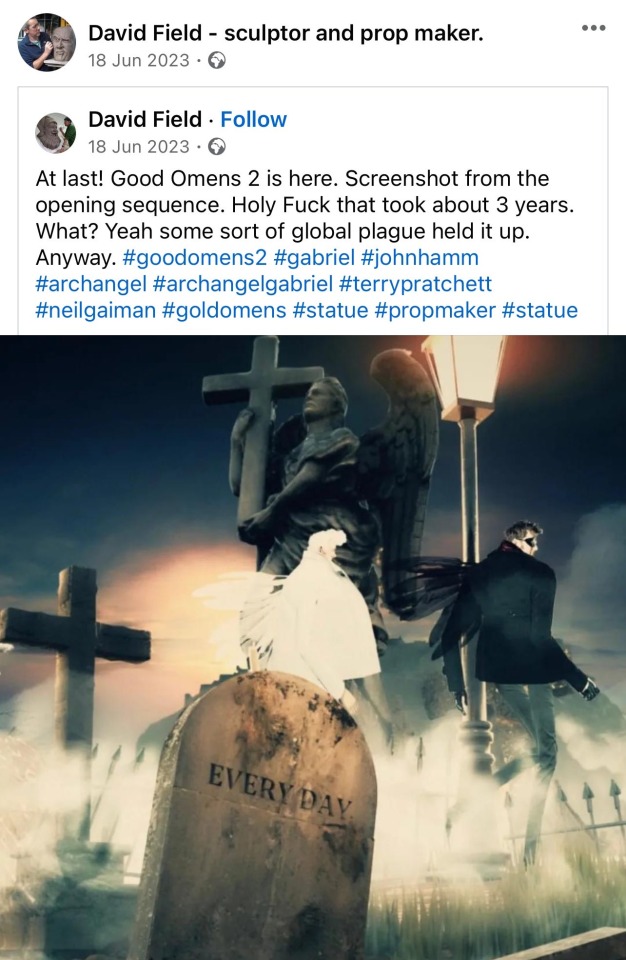
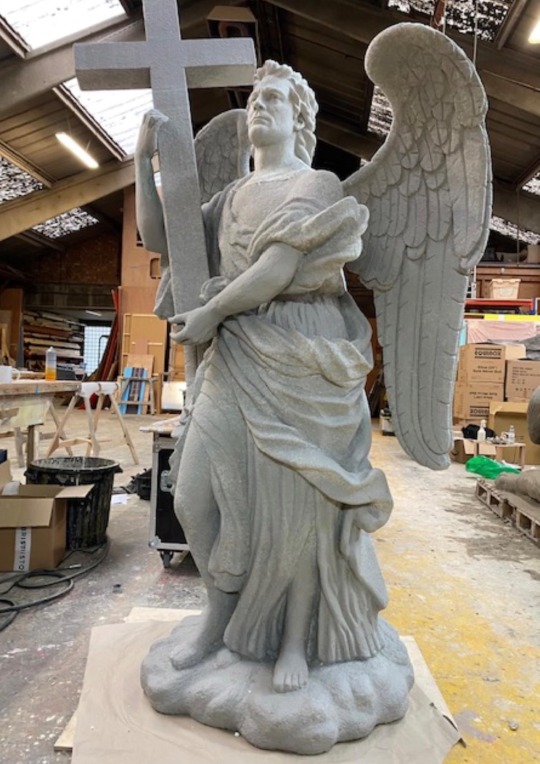
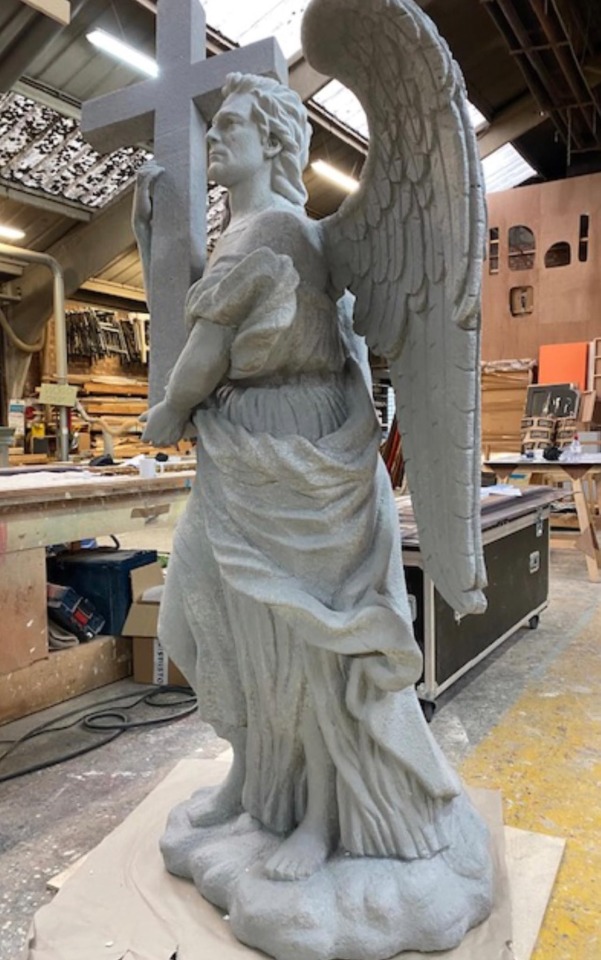
The body itself took ten days to sculpt and is a faithful copy of the famous statue on Ponte Sant'Angelo in Rome called Angel with the Cross by Ercole Ferrata. It stands on the inscription “Cuius principatus super humerum eius” (“Whose government shall be upon His shoulder”, Isaiah 9:16), and this quote makes much more sense for Gabriel than the cross in his hands. The usual iconography of the Archangel uses a trumpet or a white lily instead.
Ponte Sant'Angelo was originally used to expose the heads of those sentenced to death — each of the angelic statues on it carry Arma Christi, the Instruments of the Passion. Like the Second Coming, what seems to be a hopeful message to the Chosen Ones can also be a warning for the others.
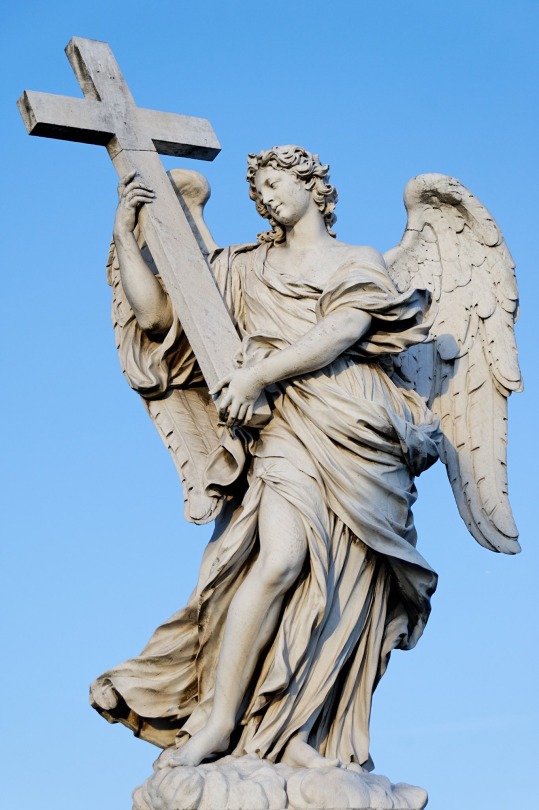
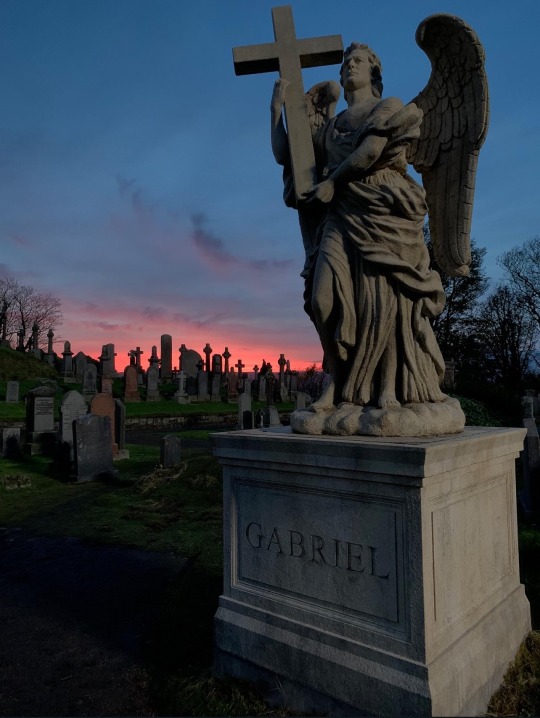
The statue of Gabriel, first shown in full in the cemetery scene of the Good Omens 2 title sequence, reappears at the very end as a part of the bridge leading to the biggest Easter egg — at least according to Peter Anderson, the animator behind it — which is the lift in the background, implying how we’re getting closer towards the Second Coming. Notice how the cross broke down in half at some point between these two scenes!
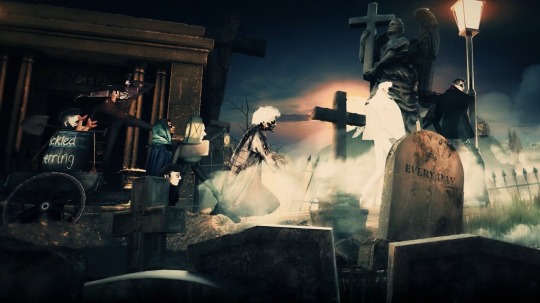
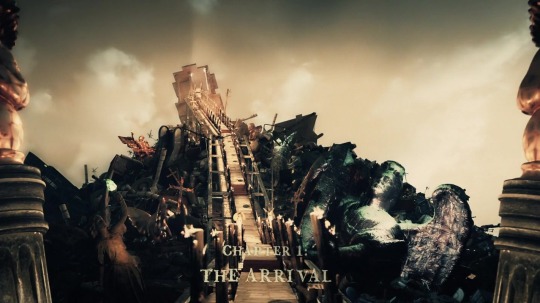
And it disappears in the plot as well: Gabriel’s memory depicts it only from his point of view, with the camera deliberately moving slightly to the right and stopping at his eye level. The centered, establishing shots show the statue with empty hands as a bookend.
I believe that this cross is meant to serve as a foreshadowing, a reminder of the absolution of sins and eternal life through Christ’s sacrifice and Second Coming. We see it only through Gabriel and Aziraphale’s eyes — when Beelzebub looks at the statue, the cross is not there.
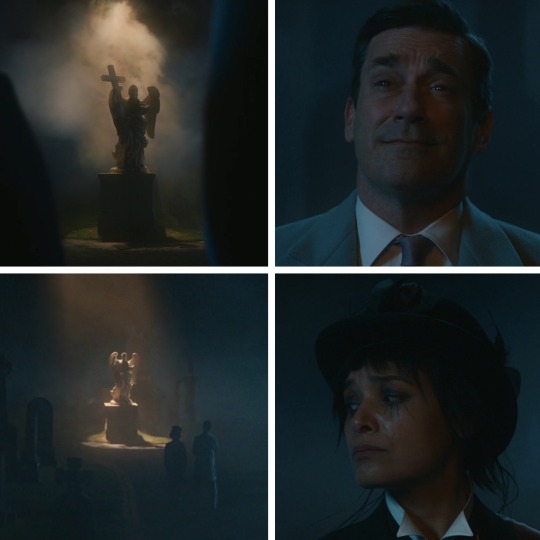
As seen in the BTS photos and videos, it’s not an editing error, but a deliberate positioning of the physical props on set. The cross was clearly meant to be a removable part of the statue and displayed in a specific way to convey a message to the audience.
The question remains: is it a reassurance, something to look forward to, or maybe rather a warning?
Not helpfully at all, the traditional use of angelic imagery in Christian cemeteries matches both interpretations.
#everything has a meaning#the good omens crew is unhinged#good omens props#archangel fucking gabriel#gabriel’s statue#good omens#good omens meta#yuri is doing her thing
812 notes
·
View notes
Text
His Royal Smugness



254 notes
·
View notes
Text
When Crowley confronts Jimbriel in the bedroom above the bookshop, and tells him to jump out the window, you can see the "Give Me Coffee" part of the "Give Me Coffee or Give Me Death" sign, and then at the end of that scene, Crowley gives Jim a mug of hot chocolate. He gives him hot chocolate instead of death.
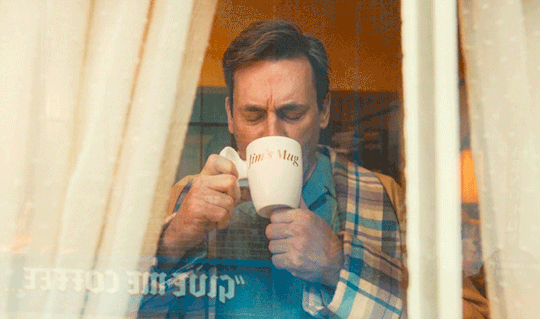
#good omens#good omens meta#jimbriel#crowley#the archangel fucking gabriel#give me coffee or give me death
440 notes
·
View notes
Text
Ineffable Bureaucracy and Ineffable Husbands
So, especially in the early days after the release of S2, I saw and heard a lot of people comparing these two as if they were the same. There were fan comics and fanart and fanfiction that included dialogue that was something along the lines of "why are they so healthy after only a few years and we aren't?" or "why do THEY get a happy ending and we don't?" And I mean, I haven't seen any of that in a while so maybe people have come to this conclusion on their own, but just in case, I wanted to point out
That they are fundamentally different. They are not the same.
And the reason why comes down to this conversation from 2x3:

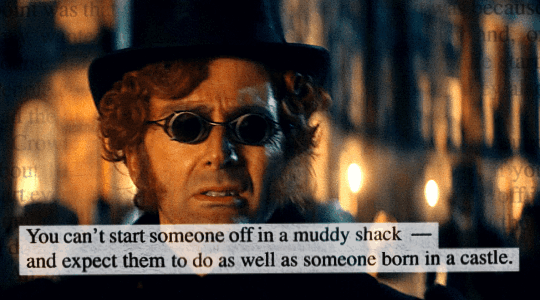
So, hold this conversation in your brain while we go through this.
First of all, we have our Ineffable Bureaucracy, Gabriel and Beelzebub.
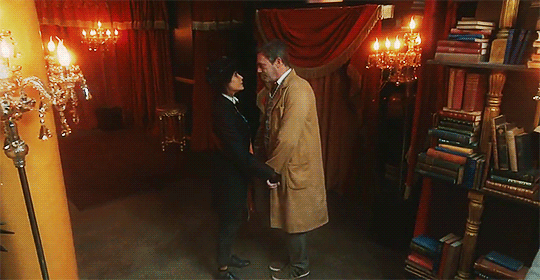
So these are the ones who, figuratively speaking, were born in a castle.
Gabriel was the Supreme Archangel for however many millenia, and Beelzebub was the Grand Duke of Hell for the same, roughly speaking. They are equals in positions of power.
So, when they fall in love, you have two supernatural authorities who have lived their existences believing that they can reasonably expect to have and keep whatever they want. After all, that's exactly what their lives have been (with the one exception being Beelzebub's Fall) - they want something, they get it, they keep it, and no one tells them no.
The biggest risk is to Gabriel. If Heaven were to find out, he would Fall. I can imagine Beelzebub being a bit concerned, but "Oh no," Gabriel probably figured "I Fall to Hell, and straight into your arms!" And I could see Beelzebub with a little smirk saying "I'd look after you, babe," in response.
The only time Gabriel actually worries is when he finds out that there's another punishment that he didn't realize was a possibility.
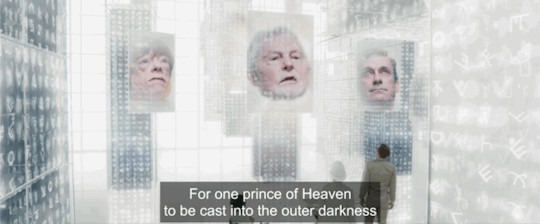
Falling to Hell is one thing, but having his memories erased is an actual threat, and possibly the first time he's ever been told no. This is when we see him panic, and leave Heaven in a mess, storing his memories away to keep them safe from the Metatron. We find out later that he was on his way to Hell anyway and just forgot halfway there and got lost.
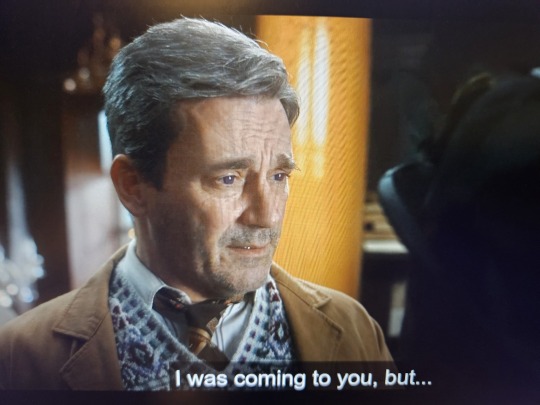
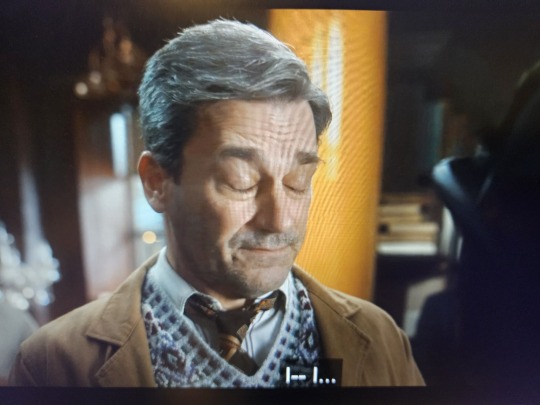
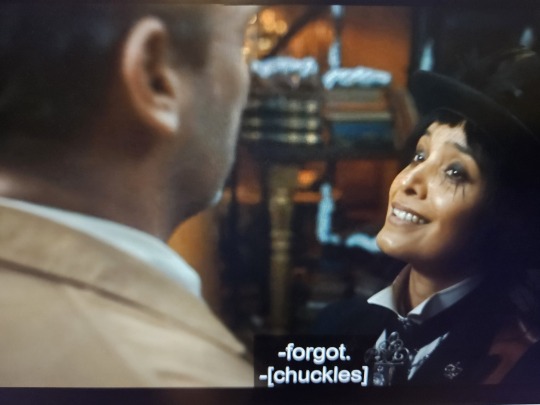
And so, we have two beings who were always told they were Good Enough, who approached each other knowing they were able to have whatever they wanted, and were therefore able to communicate and fall in love in a healthy way. They didn't need to tip toe or hide, because they had no reason to believe anyone would ever tell them no until someone did. Their risk, because of their positions of authority, wasn't nearly as great as Aziraphale and Crowley's risk.
So now we come to our Precious Ineffable Husbands
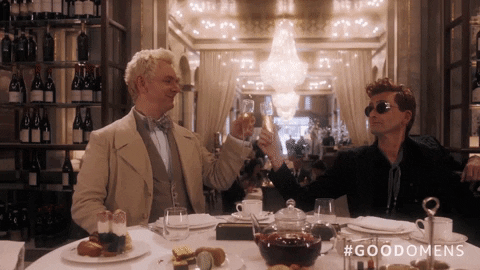
Crowley and Aziraphale start off in much lower positions on the Celestial Food Chain. We know that they have to be very careful about their relationship to avoid the repercussions. They can't mention The Arrangement out loud, they can't put their feelings for each other into words. It has been made clear to them that they are always being watched, and anything they have can be taken away from them on a whim.
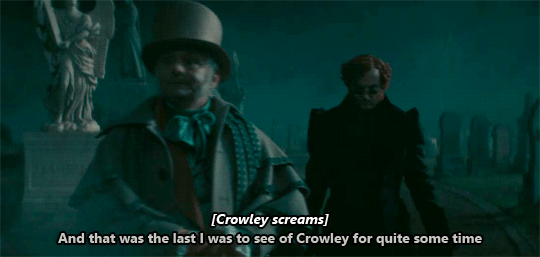
So how can they communicate safely when they've spent millenia living on eggshells and tightropes? Of course they won't, and of course it's going to be much harder for them to believe they can once they finally are safe. I definitely believe that they will get there (for my own wellbeing I have to believe that their love is stronger than anything), but they will need to fight tooth and nail in a way that Gabriel and Beelzebub didn't. All because they aren't figures of authority.
It might honestly be another good argument for Crowley taking the Grand Duke of Hell job (even though I reeeeaaaally don't want him to). It would put them in the same position as Gabriel and Beelzebub, and might give them the footing to actually escape the system (even though I think it's more likely that they're going to dismantle and/or repair the system in s3, but that's my own opinion).
These two pairs aren't mirrors of each other. Rather, they illustrate the problems with inequity that Crowley was pointing out in Edinburgh. And if S2 showed us that, I'm hoping S3 will show us possible solutions for it.
#good omens#crowley#aziraphale#ineffable husbands#aziracrow#good omens 2#good omens fandom#aziraphale x crowley#aziracrow lasts forever#gabriel#archangel gabriel#beelzebub#ineffable bureaucracy#good omens meta#good omens 2 meta#good omens analysis#ineffable fandom#this show is my roman empire#good omens thoughts
486 notes
·
View notes
Text
Angel Pinky Rings
I'm going to get strangely obsessed with finger jewelry for a moment.
Please do not ask Neil Gaiman to confirm or deny.
Before the Beginning, Aziraphale doesn't have a ring:
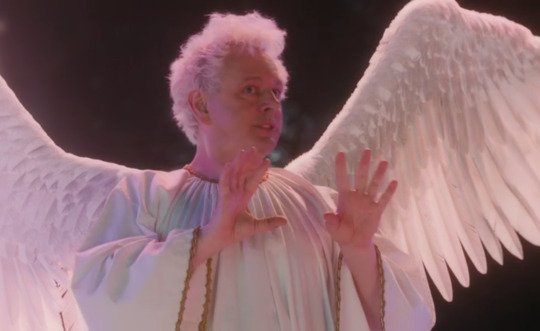
...then after the Beginning, he does:
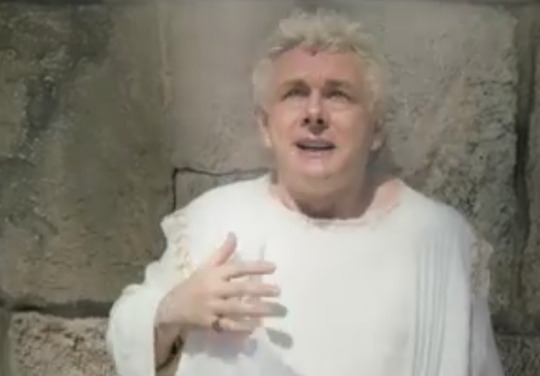
...which he wears continuously for the rest of the story:
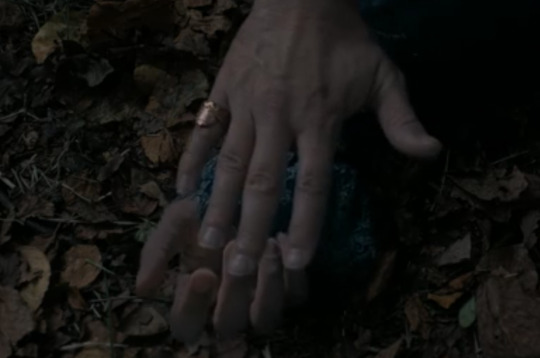
Archangel Michael
doesn't have a ring in Book of Job:

and then they do:
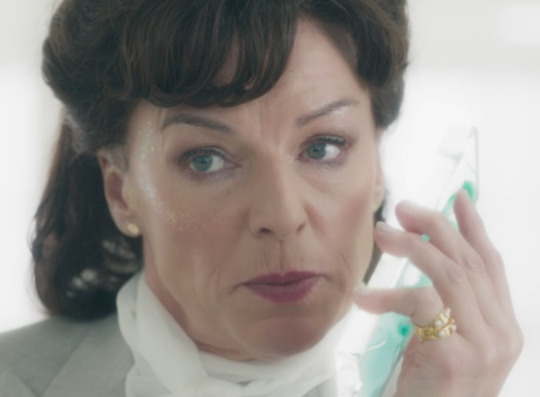
Uriel does:

...even Saraqael does:
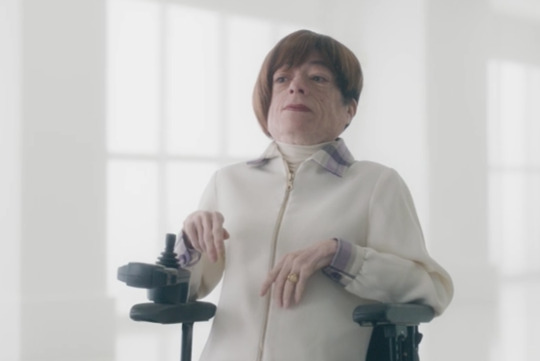
...and Sandolphon:
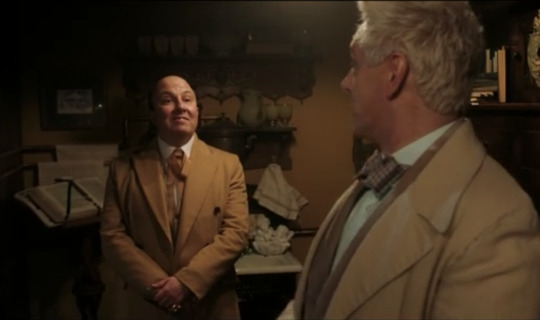
...but not the Supreme Archangel
not in Book of Job:
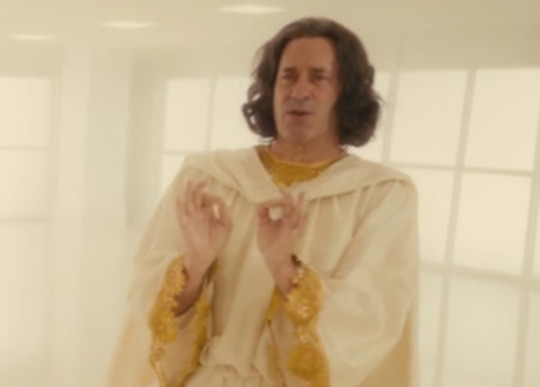
and neither before Armageddidn't:
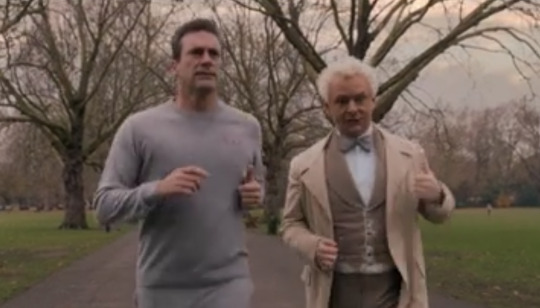
nor after:
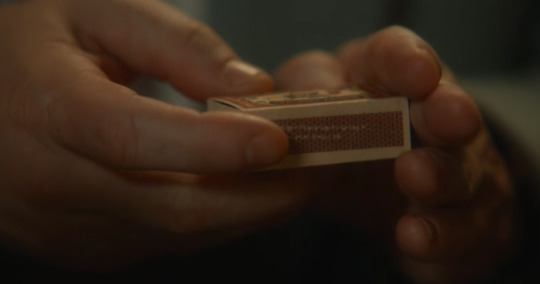
...and not the 37th Order Scrivener:
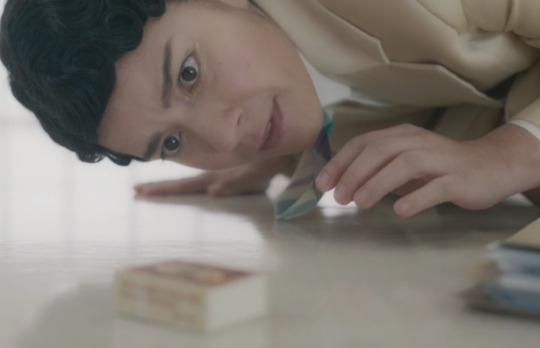
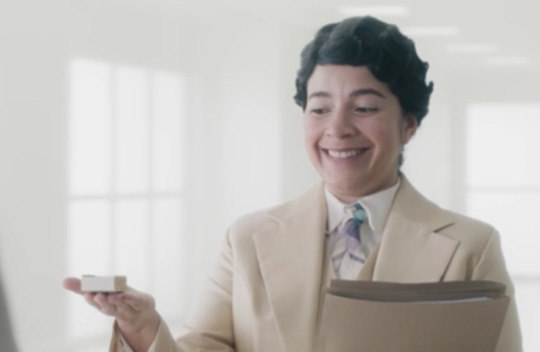
Originally I thought the rings might denote rank, but Gabriel not having a ring throws a wrench in that.
Left vs. Right
Every angel that wears a ring wears it on their left hand (everyone except Saraqael wears it on their pinky, who wears it on their ring finger) except for Aziraphale, who consistently wears his pinky ring on his right hand. Furthermore, the style of each ring appears to be unique; we don't usually get a very good look at them (or at least I don't, I have kind of crappy hardware) but the differing styles seem to be meaningful to the individual. Putting it on the left may indicate that it has a negative connotation; the fact that Aziraphale's ring is on the right sets him apart.
Protecting the Ring
Additionally, all the angels that have rings, when they fold their hands, tend to cover up their ring-bearing hand, almost protectively:

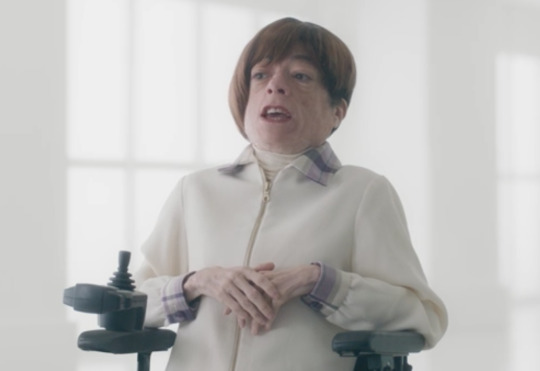
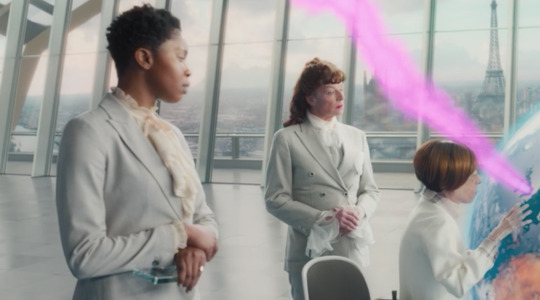
Semi-Rational Theory
The rings are vessels of memory: they are only worn by angels who have transgressed against God's will, and are worn forever after as a symbol of the covenant made between the Creator and the Servant. They dump the memories of their transgressions into the ring so that their minds are made clean, but carry the mark of their prior sin with them for the rest of time. Much like a rainbow, it serves as a promise that the transgressor will never transgress again. The angels protect it because, consciously or not, they know that this ring contains a part of themselves, and it is both precious and shameful.
Absolutely Irrational Theory
Aziraphale wears his ring on his right hand because it doesn't fit on his left. That's because it's not actually his ring; it is Angel!Crowley's, and he is keeping it safe for them. Crowley and/or Aziraphale might not even know anymore that that is what it is, but by some pact between them made before the Fall, it is in Aziraphale's stewardship to keep safe until such time as Crowley can safely have his memories restored.
Again: Please do not ask Neil Gaiman to confirm or deny.
EDIT: MAGGIE HAS A PINKIE RING
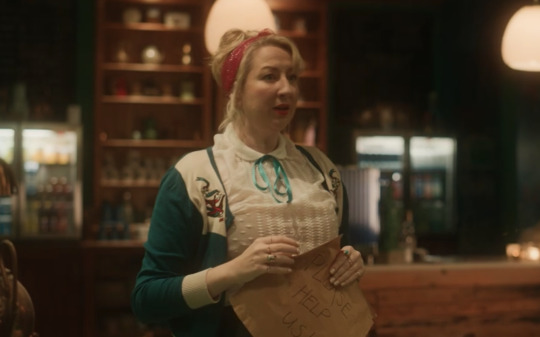
This bish is sus AF
~~~~~~~~~~~~~~~~~~~~~~~~~~~~~~~~~~~~~~~~~~~
If you would like to reblog, please reblog from this repost with additional content and references.
~~~~~~~~~~~~~~~~~~~~~~~~~~~~~~~~~~~~~~~~~~~
To read more of my original content on erasure theory:
Jimbriel, Satan, the Book of Life, and what it means for Crowley
The Erasure of Human!Metatron
Baraqiel and Azazel
or, my first and my most popular post to date:
A Nightingale Sang in 1941
#good omens#good omens 2#good omens meta#archangel gabriel#archangel michael#archangel uriel#saraqael#sandolphon#erasure theory#ivoc#aziraphale#aziraphale x crowley#ineffable husbands#angel!crowley#angel rings#ring theory
768 notes
·
View notes
Text
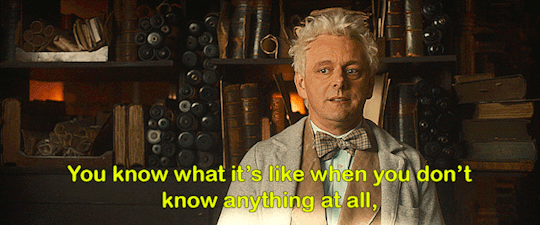
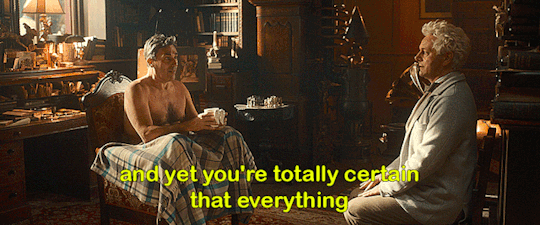
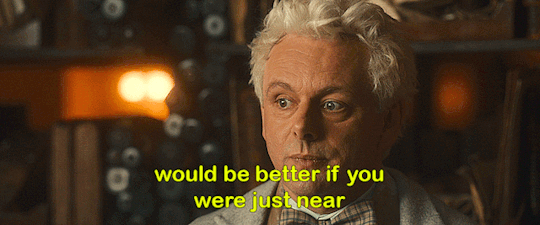
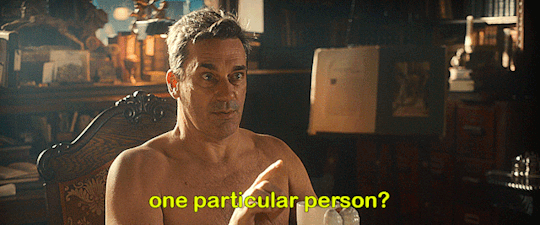
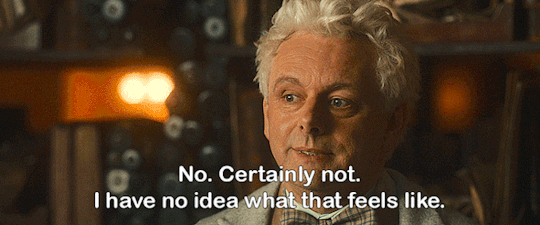
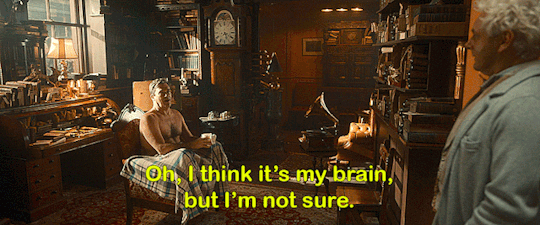
Ok, today I was thinking about this scene and for the first time I realized that Gabriel was probably talking about Beelzebub.
Oh, it's so obvious. But I'd been so captivated by Aziraphale's (Michael's) reaction to it that I never really stopped to think about it.
And when the Metatron says to Aziraphale why he believes Gabriel went to him in the first place (the whole you're a leader, you're honest, you don't just tell people what they want to hear balderdash), I think he's not correct.
I think Gabriel went to Aziraphale because he knew he was his only chance to reconnect with Beelzebub and Hell, seeing his connection (😫) with Crowley.
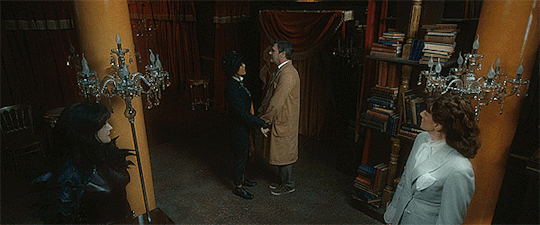
#what do you think?#good omens meta#good omens#ineffable husbands#aziracrow#crowley#michael sheen#aziraphale#good omens 2#my edit#ineffable bureaucracy#archangel gabriel#beelzebub#John hamm
251 notes
·
View notes
Text
Heaven Is A Cult

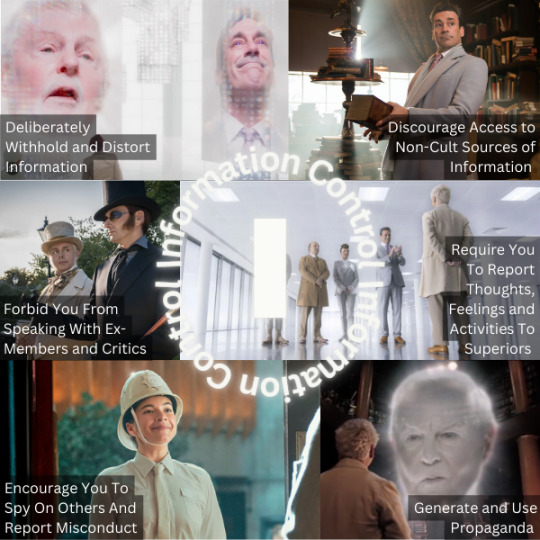


Not that any of us are surprised.
Source: The BITE Model of Authoritarian Control
#good omens#good omens season 1#good omens 2#good omens season 2#good omens spoilers#gos2 spoilers#good omens meta#ineffable husbands#aziraphale#crowley#ineffable bureaucracy#gabriel#beelzebub#heaven#the metatron#sandalphon#archangel michael#archangel uriel#muriel#the pictures are easier to view if you click on them#tw cults#cw cults
733 notes
·
View notes
Text
Good Omens S2 + Onion Headlines (Part 1 | Part 2 | Part 3 | Part 4 | Part 5 | Aziraphale Special | Crowley Special)
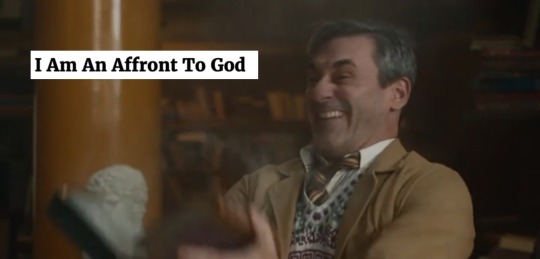
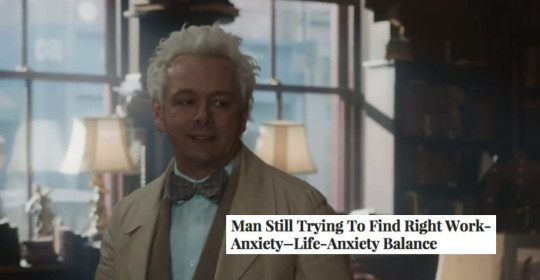
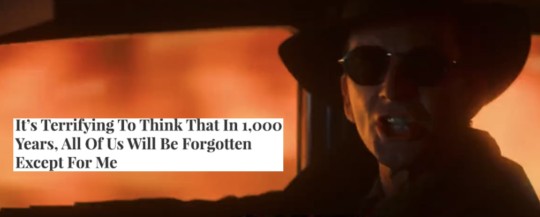


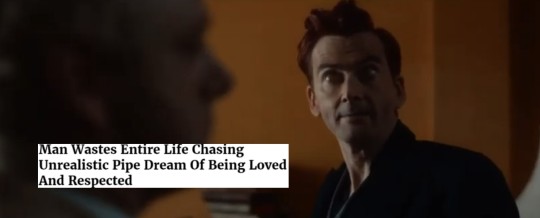
+ bonus

#good omens#good omens season 2#onion headlines#crowley#aziraphale#archangel fucking gabriel#hes just a silly gooby goober#honestly just block me at this point i will understand#frankly i wish i could block myself but im fairly certain that i black out whenever content appears and its a 50/50 chance if#i regain consciousness to rambling unhinged meta or fucking deranged meme shitposts like this#just know that im sorry#gomens shitpost
426 notes
·
View notes
Text
Still breaks my heart how you hear the ✨immortal drop-in✨ sound, and Aziraphale automatically looks to his left with a pleasant smile on his face, only to find it's not Crowley.

And I like how Gabriel appeared on the wrong side. And also how the sides haven't even really been established yet, so it's a really tiny detail that would be difficult to catch right away.
768 notes
·
View notes
Text
Acrostic ✨Clues ✨
So a neat little thing Good Omens did for the promo for s2 was create some character playlist.
Very quickly though it was discovered that each and every one of them contained a hidden clue word. By taking the first letter of the first word of the song a word related to the character would emerge. For the two examples below the words were “Ineffable” and “Tempting”.
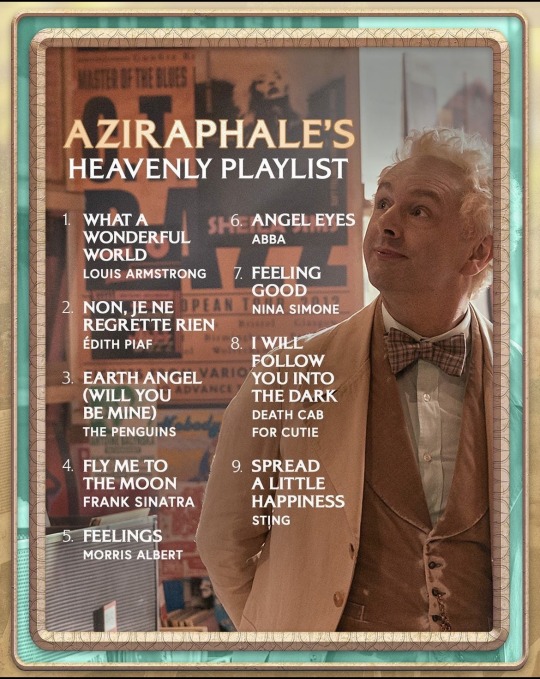
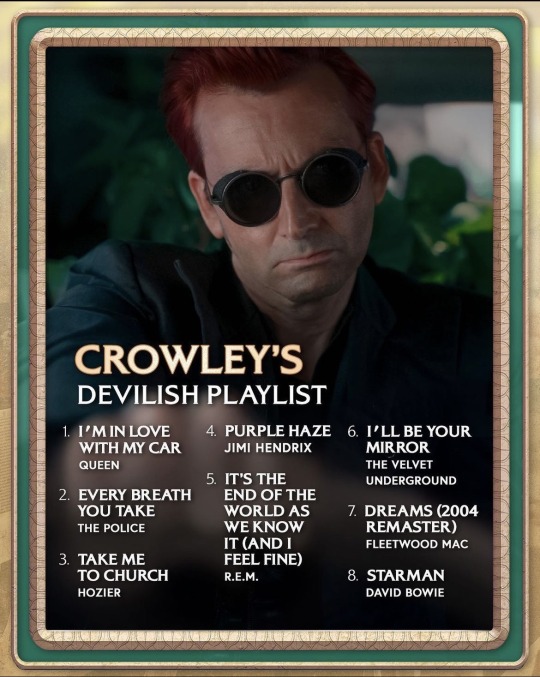
Now this technique is called Acrostic,
Acrostic - a composition usually in verse in which sets of letters (such as the initial or final letters of the lines) taken in order form a word or phrase or a regular sequence of letters of the alphabet
it’s a technique mostly seen in poems to contain hidden words, often the authors name.
but I wouldn’t be bringing this back up if it wasn’t for nothing and that’s because we see this technique in the show as well.
When Jim is really embodying his role as Assistant Bookseller he takes it upon himself to reorganize the books by the first letter of the first word of the first sentence - sounds familiar.
Except he’s doing alphabetically not to contain a hidden word you say? 
Well hold on to that real quick while I point out another clue Jimbriel says,

“There will come a tempest, and darkness, and great storms. And the dead will leave their graves and walk the earth once more. And there will be great lamentations."
Well now that I brought that quote back to your attention we are just going to focus on one particular word, Lamentations.
because what if I told you that the first four poems in the Book of Lamentations are written in an acrostic style.
Not just any style either but where each poetic verse begins with a letter of the Hebrew Alphabet. 
Now the Book of Lamentations is separated into five poems from different pov’s about the destruction of Jerusalem in 587 B.C. by the Babylonians.
The organization and rigid structure to the first four poems was really meant to contrast from the grief and disorder the people were going through. Structure that the last poem loses. Hm Interesting.
(we are not going to be looking into what this book is about I am just pointing out structure similarities here)
Expect this not the only way this structure can be used.
Acrostic structure’s are also often used as a mnemonic device. This is a learning technique that helps with memory retrieval or retention by associating things with something easier to remember, like say trigger words.
So then is it really a surprise that Jim, our Amnesiac Archangel, keeps using this structure subconsciously?
#god i really hope i am using this right#most of this is already known I just (personally) discovered a new word and got excited#acrostic#good omens#good omens 2#aziraphale#crowley#archangel fucking gabriel#archangel gabriel#good omens gabriel#jimbriel#good omens playlist#good omens clues#good omens meta#good omens speculation#good omens analysis#book of lamentations
80 notes
·
View notes
Text
The biggest Easter egg yet
I’ve been meaning to address this for a while now, but @camdenleisurepirates gave me the final push after reading my piece on Gabriel’s cross. Huge thanks for that morsel of motivation, my ADHD brain loves you.
This is going to be yet another long read, although not as extensive as my bookshop statues meta. Still, better get yourself some hot chocolate or another drink of your choice and make sure you’re comfortable!
Now, remember the X-Ray interview with Peter Anderson on Easter Eggs in the opening animation he created for the second season? Forget red herrings, apparently our fandom has a literal red phone box! I’m convinced that this whole scene is a one big — the biggest, actually — Easter Egg, and I’ll explain why step-by-step.
The red phone box Crowley used to warn Aziraphale about the Antichrist and the following Armageddon in S1, the exact one where he left change for an emergency call, seems important enough in terms of the future S3 plot, but there’s so much more going on in this frame. Not only the lift.
The angels
At the very start of this sequence we can see a fragment of an elaborate bridge guarded by cherubs sitting on two columns, maybe globes, leading to a distant structure built over a literal mountain of trash — all elements of the S1 and S2 openings which were consciously picked out by the animators and put together in a very ominous pile.
Ready for some scavenging?
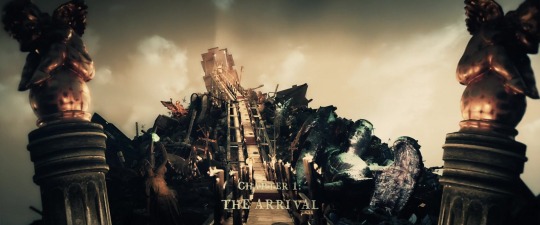

In the Gabriel’s cross meta, I already mentioned the importance of Ponte Sant’Angelo in relation to the ex-Archangel’s statue. Now it’s time to widen our perspective and focus on the full picture — quite literally. Apparently the bridge from the opening sequence has ten statues of angels, exactly as the Italian historical monument.
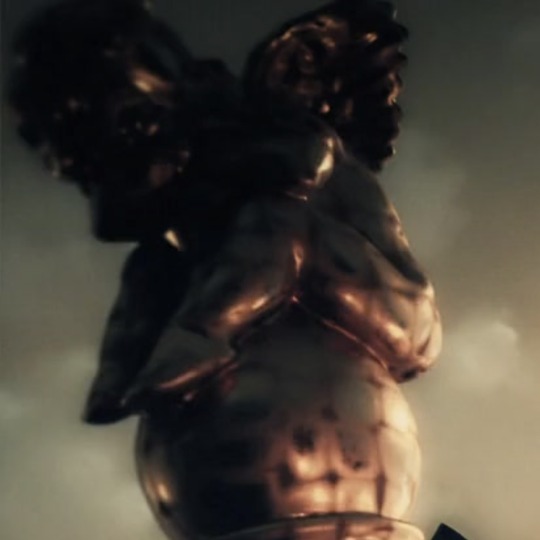
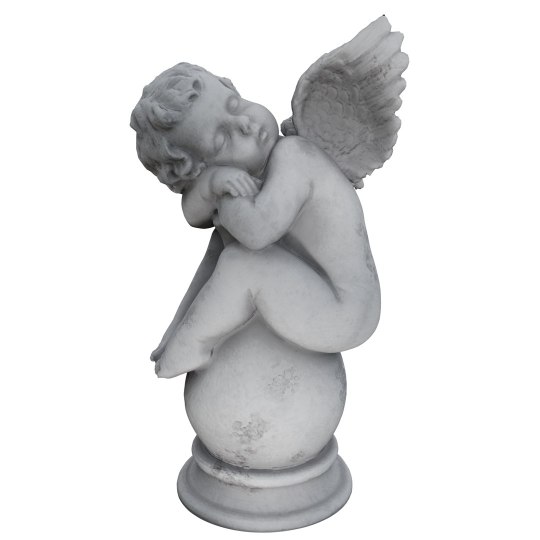
First things first though: the two big cherubs guarding the entry to the bridge might seem familiar to some of you. While they’re obviously not copies of the same statue, a very similar pair of brass cherubs is placed in Aziraphale’s bookshop to symbolize Aziraphale and Crowley. And looking at the screenshot above and the way they sleep or sulk with their backs turned on each other, they are most certainly not talking. The addition of more than one set of eyes is a lovely reference to biblically accurate angel memes though.
If we assume the traditional left-right positioning of the characters, Aziraphale is on the left and Crowley is on the right. Directly behind Aziraphale we can see a ship named “Good Traits”, but in reverse — kinda sorta confirmed by the animator Peter Anderson to be connected to the concept of the seven deadly sins on Twitter. Same that was mentioned recently by Neil in one of his asks.
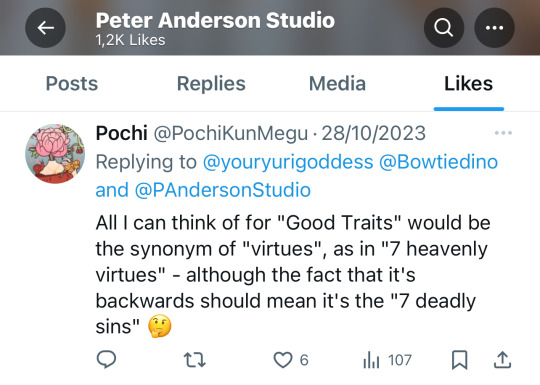
The presence of Gabriel — a renegade Archangel wielding a broken cross — on the right, Crowley’s side, seems to match this theory. It could also support one of the possible interpretations of the very last bookshop shot in the S2 finale.
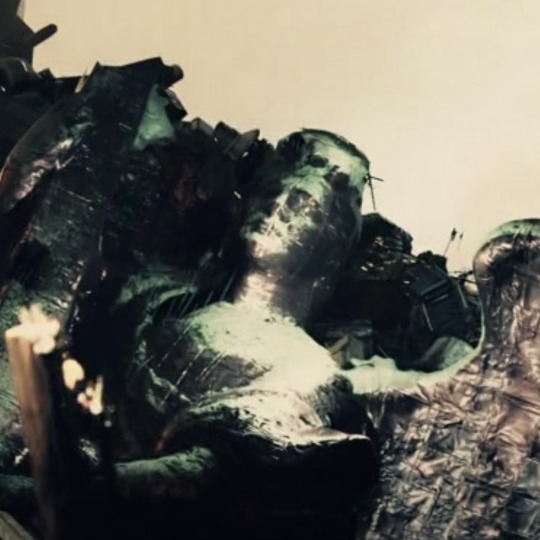
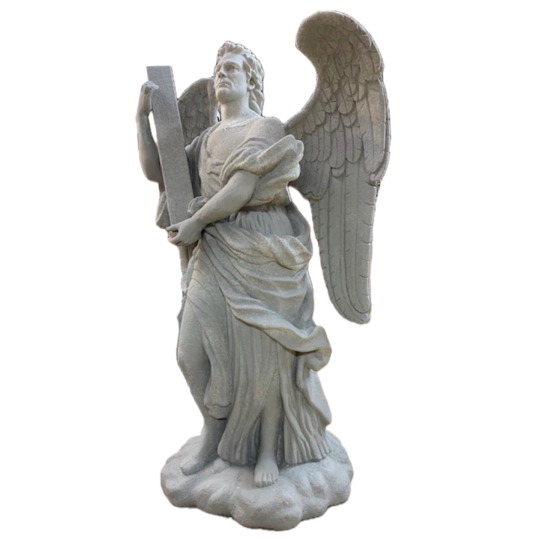
Out of all ten statues, Angel Carrying the Cross by Ercole Ferrata is considered inferior to the others on the bridge in that it appears to be a two-dimensional relief sculpture rather than an unbounded three-dimensional artwork, which seems to match Gabriel’s first impression as a character.
The inscription on the statue reads, “Dominion rests on his shoulders" — that is the weight of the cross that Christ was forced to carry through Jerusalem before being crucified. Even though Gabriel’s burden partially disappeared, the whole bridge and its environment is covered with crosses. It’s clear that we’re looking at a direct parallel of Via Crucis, the Way of Sorrows.
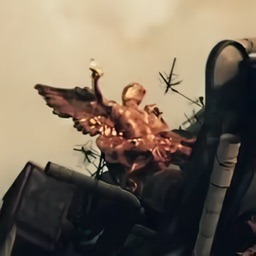
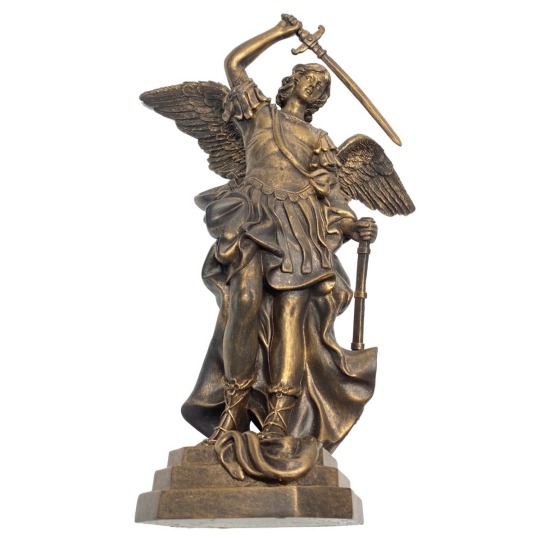
Towering over the Italian bridge, at the very top of Castel Sant’Angelo, is a statue of Archangel Michael, seen as the golden angel on the top left part of the trash pile. Aziraphale’s side, perhaps as his assistant, perhaps a rival? Legends of the Jews mention Michael as the chief of a band of angels who questioned God's decision to create man on Earth. The entire band of angels, except for Michael, was condemned to Fall — which could explain why they have such a good access to the Grapevine That Obviously Doesn’t Exist. And whatever’s going on between Michael and Dagon, perhaps.
In Roman Catholic teachings, Michael has four main roles or offices. Their first role is the leader of the Army of God and the leader of Heaven's forces in the final triumph over the powers of Hell. Viewed as the angelic model for the virtues of the spiritual warrior, their conflict with evil taken as the battle within. The second and third roles of Michael deal with death. Their second role is that of an angel of death, carrying the souls of Christians to Heaven. Michael descends at the hour of death and gives each soul the chance to redeem itself before passing; thus throwing the devil and his minions into consternation. In their third role, Michael weights souls on perfectly balanced scales they are often depicted with as their attribute. In their fourth role, Michael appears as the guardian of the Church. Might be the reason why they’re the closest to the building on top of the mountain.
It looks like Michael lost their sword though, just like Gabriel lost a part of the cross he was supposed to carry. The sword in question was supposed to be used to slay the dragon — Satan, the Adversary — according to John of Patmos and his Book of Revelations.
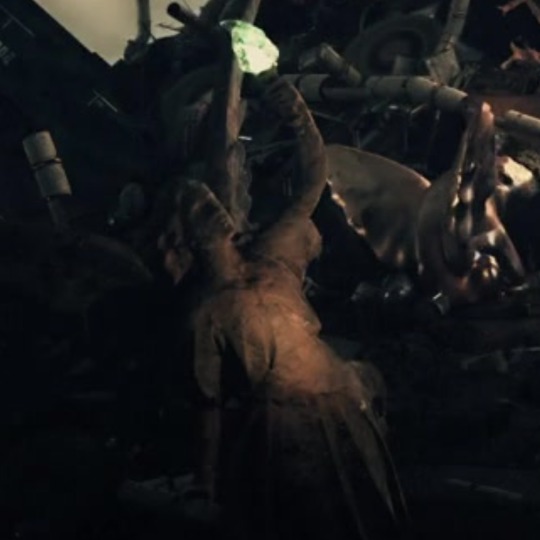
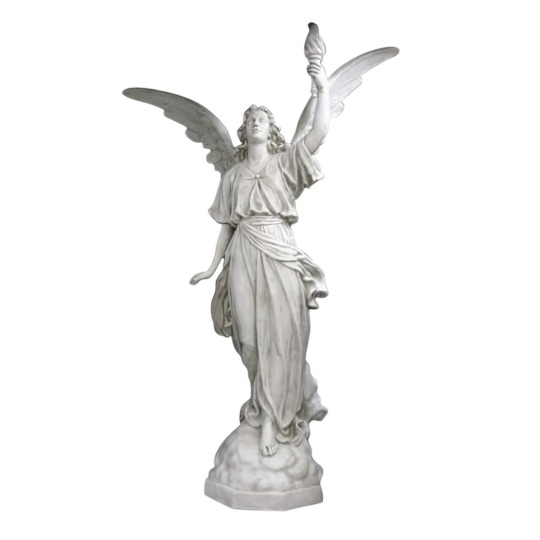
Speak of the devil: interestingly, there are two copies of an anonymous variation of the Angel of Light statue appearing twice on both sides of the bridge. Both the title as well as the statue itself seem like obvious references to one (former) angel literally called the Lightbringer, Lucifer. Perhaps one of them is representing his son, the Antichrist, instead, with the both of them helping out the Ineffables on two opposing — or perhaps only parallel — sides of the bridge?
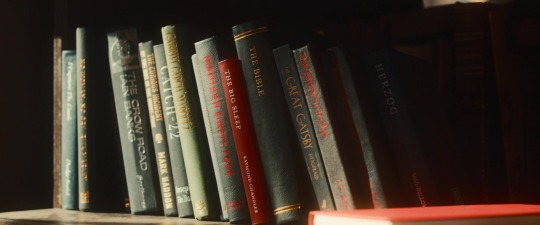
The light carried by Lucifer appears to be green, a color used in the series as a visual representation of Hell, but on the intertextual level might also serve as a reference to F. Scott Fitzgerald’s classic novel The Great Gatsby and the green light at the end of the Daisy’s dock symbolizing the undying love, desperation, and longing for an unattainable dream. In the story, the color represents the limitations of power and money. Not surprisingly, the novel appears on Jim’s bookshelf and is part of the Good Omens book club — a list of personal recommendations from Neil Gaiman and Douglas Mackinnon for the fans to catch up on before the next series.
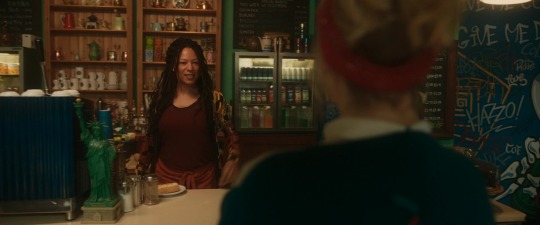
Last but not least, the possible connection to Libertas as the inspiration for the Statue of Liberty, shown multiple times in S2 as a foreshadowing of our character’s trip to America in S3. The related quote of Patrick Henry “Give me liberty or give me death” becomes even more relevant if we consider how the motto of the French Revolution was sometimes written as Liberté, égalité, fraternité ou la mort (“Liberty, equality, fraternity or death”). A lesson surely learnt by a certain angel back in 1793, when he was held prisoner for the last time before being forcefully taken Upstairs in the Final Fifteen.
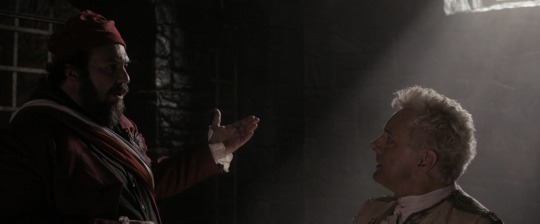
The bridge and the castle
Okay, these are the basic observations. Now a brief historical overview and we will reach the fun bit in a jiffy.
Have you ever wondered about the meaning of this whole complex? It wasn’t always angelic, but named after a Roman noble dynasty. The Aelian bridge was built by the Emperor Hadrian in 134 AD to span River Tiber from the city center to his mausoleum. With time, the remains of more emperors were put to rest in there, until it was plundered and destroyed in a war. Then the remaining structure was transformed into a military fortress and a castle serving as the papal residence in times of war.
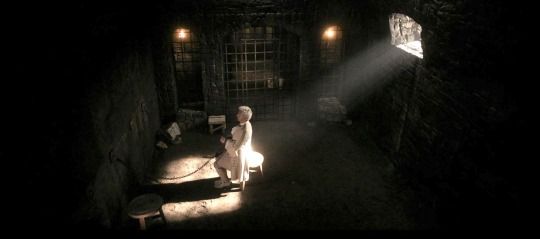
The Papal State also used Sant'Angelo as a prison; the Renaissance philosopher Giordano Bruno was imprisoned there for six years. Executions of the inmates were performed in the small inner courtyard, but they weren’t the only deaths in the area. On the other side of the bridge, in the adjoining Piazza del Ponte, under the watchful eyes of the stone likenesses of two saints, the public executions were held, and the heads of the criminals were brought onto the bridge and exposed to public view there.
As a prison, the former mausoleum is also the setting for the third act of Giacomo Puccini's 1900 opera Tosca. Long story short, the eponymous heroine convinces her lover to feign death so that they can flee together. Unfortunately, they are betrayed and the firing squad shoots at him with real bullets instead of blanks. Tosca believes in the quality of his acting performance rather than the truth, and when the realization hits her, she leaps to her death from the Castel’s ramparts.
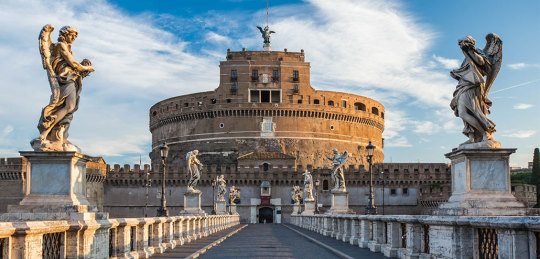
After Nero’s bridge was destroyed, the travelers were forced to cross this bridge as the only direct route to the Vatican and St Peter’s Basilica, earning it the nickname “the bridge of Saint Peter”. That’s why in the 16th century Pope Clement VII erected statues of Saints Peter and Paul at the ends of the bridge, guarding it as they are supposed to protect the entry to Heaven.
In 1688 the bridge was embellished with ten angel statues, five on each side of the bridge, carrying Arma Christi, the Instruments of the Passion. The Good Omens characters represented by those statues in the opening sequence might be other instruments of Christ’s suffering as parts of the system that needs to be overthrown or replaced.
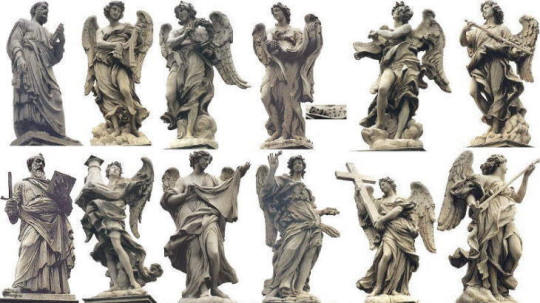
One angel appears particularly important in the context of both the bridge and the Second Coming — Saint Michael the Archangel.
Legend holds that the Archangel Michael appeared atop Hadrian’s mausoleum, sheathing their sword as a sign of the end of the plague of 590, thus lending the castle its present name. A less charitable yet more apt elaboration of the legend, given the militant disposition of this particular Archangel, was heard by the 15th-century traveler who saw an angel statue on the castle roof. He recounts that during a prolonged season of the plague, Pope Gregory I heard that the populace, even Christians, had begun revering a pagan idol at the church of Santa Agata in Suburra. A vision urged the Pope to lead a procession to the church. Upon arriving, the idol miraculously fell apart with a clap of thunder. Returning to St Peter's by the Aelian Bridge, the Pope had another vision of an angel atop the castle, wiping the blood from his sword on his mantle, and then sheathing it. While the Pope interpreted this as a sign that God was appeased, this did not prevent Gregory from destroying more sites of pagan worship in Rome. In honor of the vision and Michael, the bridge was renamed in their name.
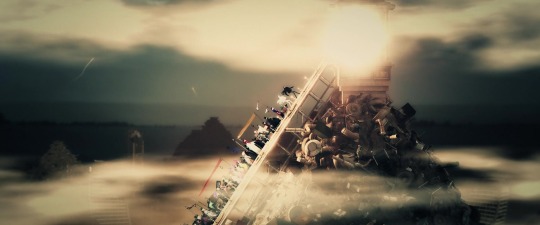
What if the procession from the opening sequence was meant to imitate the procession led by the Pope from the legend? What if Aziraphale, now officially a Supreme Archangel, Commander of the Heavenly Host, is the one actually leading it, with Crowley finally at his side as his partner and second in command, just like it was proposed by him in the Final Fifteen?*
What if by some reason, maybe personal ambition, maybe just a tragic coincidence or situational necessity, there really was an impostor in Heaven, and Metatron — the so called Voice of God who seemingly doesn’t speak up for Herself since Job’s test — has been playing a winged version of the Wizard of Oz all along?
It would make just the perfect sense if not for one tiny detail. The procession we see on the bridge is actually led by Crowley, which doesn’t fit the parallel at all — unless it’s actually a proof of an ongoing body swap, as the mismatched names of the actors could also suggest?
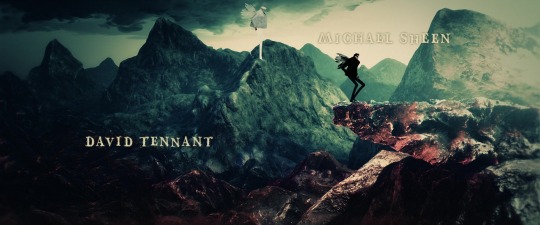
The mountain of trash and the bookshop
The symbolic mountain of trash we can see Aziraphale and Crowley climb is a reference in itself. To an actual mount called Zion, believed to be the place where Yahweh, the God of Israel, dwells (Isaiah 8:18; Psalm 74:2), the place where God is king (Isaiah 24:23) and where God has installed king David on his throne (Psalm 2:6).
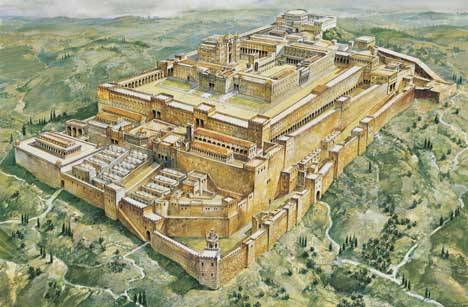
In a literal sense, it’s a hill in Jerusalem, although the sources refer to three different locations in different contexts — although for the purpose of this meta the Upper Eastern Hill (Temple Mount) makes the most sense. Its highest part became the site of Solomon's Temple. The same King Solomon the rituals in Freemasonry refer to. Masonic buildings, where lodges and their members meet, are sometimes called "temples" specifically as an allegoric reference to King Solomon's Temple, not actual places of worship. And Aziraphale’s bookshop is built around Solomon’s Magic Circle.
In a metaphysical sense, and especially in the context of the Christian New Testament, it is also believed to be a part of Heaven — the heavenly Jerusalem, God's Holy, eternal city. Christians are said to have “(…) come to Mount Zion and to the city of the living God, the heavenly Jerusalem, to an innumerable company of angels, to the general assembly and church of the firstborn who are registered in heaven” (Hebrews 12:22-23 cf. Revelation 14:1). Just like the procession were following in the opening sequence.
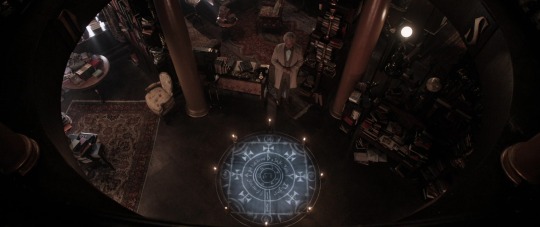
There’s been some speculation whether the lift on top of the mountain could symbolize Aziraphale’s bookshop, or, more specifically, the oculus in its centre. If you look closely at the enhanced screenshot, you can see that the dome isn’t made of glass and that it looks like a tower (a church’s bell tower, perhaps) more than a whole building.
And there is an actual doorway in there — not like the modern lift doors — opening up towards the source of that white, heavenly light. And what kind of enlightenment can you usually find up in the skies or heavens?

We’re welcomed to crack open the doors to the Heavenly Sanctuary — the Most Holy place, Sanctum Sanctorum, the Holy of Holies — to undraw the final curtain and finally stand eye to eye with God. Who knows, maybe even ask some questions or listen to some answers.
Or, at the very least, to meet one of Her forms known as Jesus Christ. Because that’s precisely where he serves as our (humanity’s) Mediator and the Holy Priest after his Ascension to Heaven. The structure at the top reminds of some temple architecture seen in Antiquity and Christianity.
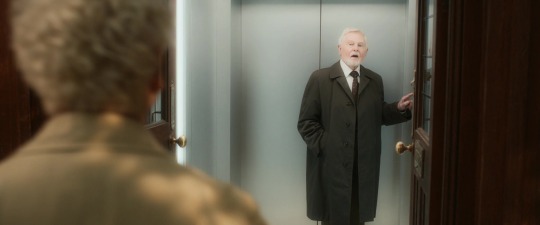
The Catholic Church considers the Church tabernacle or its location (traditionally at the rear of the sanctuary) as the symbolic equivalent of the Holy of Holies, due to the storage of consecrated hosts in that vessel and their meaning as the Body of Christ. Tabernacle is commonly marked with a red light turned on and off depending on His presence or lack if it.
Looks like He’s already in the area, one way or another, keeping eye on some things.
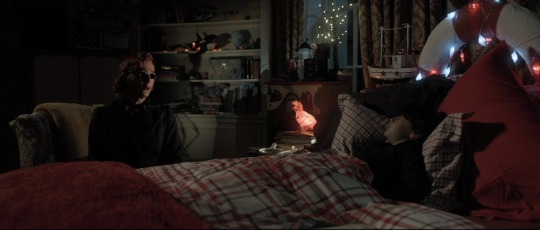
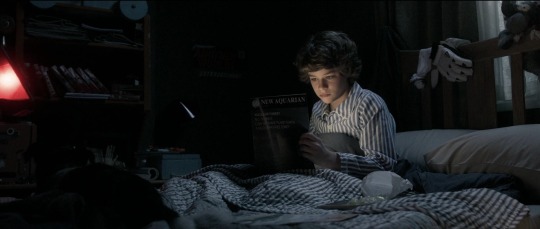
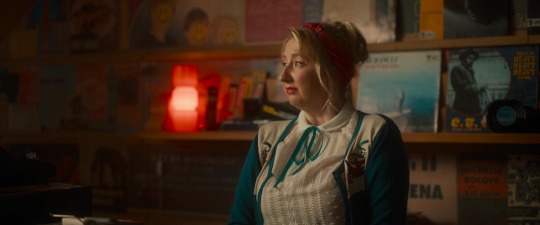
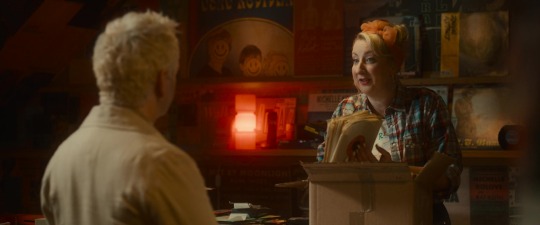
Are we following a procession of believers happy to embrace their one and true Savior? Or are they actually protesters on their way to dethrone the authority and the system?
Guess we will have to wait and see.
#the good omens crew is unhinged#everything has a meaning#title sequence#angels everywhere#archangel fucking gabriel#gabriel’s statue#bookshop statues#statues update#ponte sant’angelo#let there be light#good omens analysis#good omens meta#bible fanfiction#yuri is doing her thing
159 notes
·
View notes
Text
Can I just say how much I adore Good Omens’ portrayals of falling? I especially appreciate Gabriel’s weird abrupt turn in s2, because sometimes it really is like that.
My own loss of faith took years. It also took about 10 minutes.
If you had asked me that afternoon how I felt about [pick any controversial topic], I would have been 100% on the party line. And that wasn’t a performance or a mask, that was what I genuinely believed. Ask me about those same topics the next morning, and my positions on ALL OF THEM had completely changed.
Because: beliefs are related to each other! They support each other! You can’t always change one belief without changing dozens of others that are connected to it. So that final switch was turning a hundred different switches on the switchboard. In the years leading up to it, I was collecting those switches. I was installing the switches. But they stayed firmly in the Off position. These were things other people believed. They could only flip (becoming things I believed) once they had ALL been installed, because they ALL had to flip at the same time.
To people who haven’t experienced that (or who lost their faith in a different order / for different reasons), a gradual, piece-by-piece process probably looks more realistic. It’s way, way more common in fiction. But I personally find those portrayals to be so alienating. It often feels like storytellers can’t put themselves in a believer’s shoes at all. Like they’re writing a character that never really believed any of that stuff, deep down. So it’s very easy for that character to shed bits and pieces of those beliefs over time, because they were never actually integrated into their concept of reality.
Compared to that, Gabriel feels so much more real.
Because there won’t always be a nice, gradual Questioning Phase in between “archangel fucking Gabriel” and “what about no armageddon”. Sometimes it’s a long, invisible process of data gathering — all while 100% on heaven’s team — punctuated by a very very sudden freestyle dive.
#good omens#good omens 2#good omens spoilers#good omens 2 spoilers#ex christian#exvangelical#ex fundie#good omens meta#good omens analysis#the archangel fucking gabriel#gabriel good omens#good omens gabriel#ineffable bureaucracy#good omens 2x06#sauntered vaguely downwards#million lightyear freestyle dive#exvie#ex fundamentalist#all the discussion on this post makes me feel so warm#I’m so happy this resonated
265 notes
·
View notes
Note
I was wondering if you've talked about why Gabriel was on a jog in season 1 episode 4. It always felt off to me since it's such a human activity
Hi @anxious-al! 💕 Hope you're having a nice week so far. *gets the mugs* as there's always hot chocolate available for Gabriel-themed questions. 😊
What a time to be going for a "human" jog, eh? This takes place on the morning of The Last Day of The World:

Gabriel is supposed to destroy this planet later that day and he's down on it, alone, jogging in the park... why?... and what of the human woman dressed as an angel at the edge of the park?

The scene wherein Aziraphale interrupts Gabriel on a morning run in the park begins with one of the strangest moments in the series-- Aziraphale being distracted by a human woman dressed in head-to-toe gold with harp-like angel wings. She is a performance artist and her art is that she is dressed as an angel. She stands there, silent, sending her artistic message for both the characters in the story who notice her and for us as the audience to interpret. This makes her a bit meta for the story of Good Omens as a whole.
What message is The Angel Woman saying to her fellow humans with this? is a question that leads us to another one as a result:
What is Good Omens saying by using angels and demons in their story written for us humans?
Perhaps that there is divinity in humanity? Perhaps that we spend all this time glorifying holy beings that we can't prove even exist when, really, we humans embody the angelic and the demonic and everything in between? That we're really the magical ones?
The Angel Woman is a character in a story written by humans who are using angels and demons to make points about human living... and who are the other characters in this scene? Gabriel and Aziraphale... a pair of angels on Earth and who are both engaged in aspects of what they might see as "human" living.
This scene is one in the story pointing out that "human living" is really just living, period.
Aziraphale stops and contemplates the angel-dressed performance artist and that is the start of the scene. The "human cosplaying" Gabriel then jogs by them-- paralleling both the angel who lives like a human and the human who is dressed as an angel. Here's The Supreme Archangel of Heaven on the last morning on Earth and what is he doing?
He's jogging in the park. Like a human.
The episode is called "Saturday Morning Funtime" and has more Gabriel in its front half than any episode prior to it, as we begin to see that he's actually who it's named for. Everyone is miserable ahead of Armageddon but the one who has a Saturday Morning Funtime routine is Gabriel. This guy who is the commander of the armed forces of Heaven and entrapped by a supernatural fascist regime hellbent on destroying this place?
Yeah, he secretly kinda loves Earth.
Gabriel is keeping himself from going mad by carving out some escape time on Earth where he does some moderate exercise in the fresh air and clears his head. No one knows who he is down there. He's just another hot dude running in the park. It gets him away from the other angels always circling him like vultures and gives him some precious alone time.
There are other scenes that indicate that, as Earth has gone on, Gabriel has been using the power of his position to escape to it from time to time. Gabriel's only possessions until S2 are his custom-tailored clothes and they were made on Earth. He shows a curiosity about how Aziraphale chooses to live in the sushi scene in 1.01. Yes, he's judgy about it but he's judgy to hide the fact that he's asking out of interest-- rather than using the power he has to order Aziraphale not to make his own choices over it.
Gabriel is shown to be a lot more "live and let live" than he might initially seem to be. He is one of the only angels who doesn't view the demons as beneath them and he covers for Michael's relationships with them. Several scenes suggest pretty heavily that he's known about Crowley and Aziraphale for ages and has been keeping that knowledge from The Metatron. He doesn't care that Aziraphale does human things on Earth like eating or that he wants to live a more human-like existence. He doesn't totally understand all aspects of it but that doesn't stop him from being more fundamentally curious about it than anything else.
Gabriel actually doesn't care that Aziraphale's in love with Crowley. Gabriel can get the appeal, actually. Gabriel knows how it goes anyway... he's got a bit of a thing for the "informant" he references to Aziraphale in 1.01-- Lord Beezlebub, the only being he feels like he really be anything close to his true self around, who also happens to be a demon. The demons are supposed to be the angels' mortal enemies but Gabriel thinks that's kind of bullshit. They're just people and he remembers what a lot of them were like before Hell became a thing. They were smart, creative people, most of whom did little wrong but for asking the same questions that Gabriel privately asks himself daily.
So, he's been coming down to Earth to check it out for awhile, when he can come up with an excuse to escape his prison. Sometime pre-S1, he started to do more than observe and basically got himself a hobby in jogging, like a human might do. Something for him and him alone. This is a big deal because Gabriel has virtually nothing else that is own.
Gabriel doesn't own a single, non-clothing material object in S1 and never has at this point. The first present he'll ever be given is the fly in the matchbox from Beez. His clothes are his only possessions, which is partially why he's so vain about them. They are the only way he's allowed to express a sense of individuality in Heaven-- and he made that happen.
This is related to the jogging and is a much, much bigger deal than it might initially seem...

In S2, when we go back to the Job minisode era, we see that all of the angels used to dress in, more-or-less, the same thing. They all look like what they are-- members of a cult. Even The Supreme Archangel is wearing basically a white sheet roped off in gold. The homogeneity of the look is the point.

There's a psychological reason why cults of all sorts-- and armies of all sorts-- have an uniform. It's to reinforce a sense of negative groupthink over a sense of individuality. When you are allowed to dress as you wish, you have freedom of expression, and this obviously causes you to consider how you wish to express yourself to others. It gives you the free reign we all should have to be who we are-- and to be able to consider who that is and evolve our sense of self over time. This is absolutely against the mindset of dictatorships and cults and anything in that vein.
The last thing they want is for people to see themselves as individual people because that stuff gets dangerous. They might get ideas. They might form their own opinions and start to act on them. It makes people harder to control. This is why Gabriel and his clothes are so important.
The only way the whole 'everyone is basically wearing a table cloth' situation changed for the angels sometime post-Job is if The Supreme Archangel okayed it. He's the only one with just enough power to have made this happen, if not enough power to overthrow The Metatron on his own. Gabriel saw Aziraphale begin to wear different things on Earth with the built-in excuse of Aziraphale having to blend in with the humans and white robes were no longer a style that would work.
Aziraphale, as a result, became the first angel to have an excuse to express himself as an individual because he got to choose what he'd like to wear while he was on Earth. Gabriel noted this and basically said to himself that looks fun. Our dude was very tired of this white robe situation and seeing Aziraphale get to play made Gabriel want to as well so he went to Aziraphale at some point and basically said teach me about what the humans are doing about clothes.
Gabriel had an excuse to change his look, too-- he'd have to go to Earth sometimes to do Supreme Archangel Checking Up On Stuff Things. He'd have to look like a human, too. He loved it. Playing human dress up was super fun and brought all new kinds of thoughts. What fabrics he liked, what looks he liked, what he thought about how the different clothes looked on him, what made him feel different ways about himself. Clothes are self-expression, after all-- they reflect how we feel about ourselves and support the image we are trying to project. Gabriel got into this, big-time, and then turned around and asked the dangerous question to himself:
What if we did this in Heaven, too?
What if he used what power he had to change the rules about what the angels wore? What if he told everyone they could wear whatever they wanted? The army would still have an uniform for when they were running drills or whatever and maybe there'd be a color-scheme because Gabriel knew The Metatron was going to lose it about this so he came up with some parameters but he basically overthrew the tablecloth tyranny and told every other angel that they were free to express themselves the way they wanted and, if you ask me? That's why he and The Metatron are snarking about Gabriel's suit during his trial.
The Metatron never got over the fact that Gabriel pushed the clothes thing and knew how to get just enough of what he could without making it more trouble than it was worth to kill him over it. The Metatron takes some evil delight in telling Gabriel that "appropriate raiment" will be provided for him-- he'll have to wear what The Metatron dictates, in other words-- now that he'll be a bottom-of-the-barrel junior recording analyst. Gabriel, though?
He got the last laugh. He used taking off his suit as a reason to leave, along with clearing out his non-existent desk, and fled Heaven buck ass naked rather than put up with The Metatron's bullshit for another minute.
The moment Crowley fell in love with Gabriel was when he saw just how much Gabriel loathes The Metatron in these just take me out back and shoot me ffs faces he was making during his trial:

Anyway, the point is that all the angels are following Gabriel's lead and that's probably half the reason why almost everyone in Heaven dresses in a variation of Aziraphale or Gabriel's styles. (Ever notice how Michael and Uriel look like they're in some kind of suit battle and both of them are trying to emulate Gabriel a bit?) While many of the angels aren't really reinventing the rules of fashion up there, the idea worked: they all look different from one another. They all can express themselves as they desire when it comes to how they look. They've all had to think about themselves for at least long enough as it takes to come up with outfits and view themselves as an individual person to do so.
It's perhaps worth noting in here then, too, how funny it is that The Metatron is a floating head... that's how he presents himself. He's the one character who doesn't have a body. It's symbolic of how he feels he's above even the idea of having anything like the pesky needs of human corporation. The ideal of Heaven is him, in his eyes, and he is above the vessel through which all living beings actually live...
...and the one challenging him every step of the way as much as he can is The Supreme Archangel...
...who, amusingly, happens to have a rather pleasing physical corporation appreciated by many, many different sorts of beings.

Looked at that way? Gabriel's peacocking about his clothes is not pure vanity but just the best example of what little rebellious fires he's been able to start Up there. A focus on clothes is also a focus on your body-- for better or worse-- and so it's not really surprising that Gabriel's Earthly hobby is looking goooood in some grey sweatpants while he escapes a little from the pressures of his world.
There's something kind of delicious about Gabriel deciding that he has some Saturday Morning Funtime now-- he has an exercise routine. He's like peace out, MetaT-- I'm going to take my fantastic corporation *jogging*. Rot in Hell, you fascist Mr. Potato Head...
Aziraphale is interruping Gabriel's alone time in 1.04 and if you look closely, you'll notice that Gabriel actually looks upset as he's running before Aziraphale sees him. He doesn't actually want to destroy Earth. He feels he has no choice and he's terrified of The Metatron but he likes Earth. He doesn't fully understand of it-- to be fair to him, no one really does lol-- but he likes it enough to have been escaping to it for awhile now.
By S2, in a parallel scene to the jogging one, Aziraphale will be beginning to get the idea of him and Gabriel both having versions of the Heaven-induced perfectionism and anxiety a bit more, though... and about how that's not any different from humans who go through the same thing.
The angel human doing performance art (complete with foreshadowing the discus halo) in S1:

The art of the Gabriel statue in Edinburgh in S2:

In S2, the art is a human-made sculpture deitifying Gabriel. It causes Aziraphale to further consider what life might have been like for a being who is, really, just some dude, but who has been held up as a holy symbol in this way by angels and humans alike.
Adding to this is that the statue of Gabriel is in the middle of a human graveyard. While this has a really eerie layer in S2 considering that we see it after Gabriel has fallen, which is a kind of death, and now lives among the humans, there's a way of looking at it that is also in keeping with what S1's human performance artist angel was talking about-- there's not this big line between these kind of beings.
Emphasizing this? The Angel Woman isn't just dressed as an angel-- she is also wearing a dress and a human sun hat. She reflects how having a halo hanging over your head symbolizing your need to be perfect in a way that causes you to see yourself as someone who should be above humans is not just an angelic thing-- it's a very human thing, too. That's the point of these angels and demons in Good Omens. They're just like us in every way that really matters and their stories are no different at the core from what we experience.
Crowley and Aziraphale actually have it a lot better than most of the angels and demons. They have been able to live on Earth since the beginning. They aren't completely free of the regime that threatens them but they've found a way of escaping it as much as they can. They've been free to learn and explore and experiment and enjoy much more than the others have. They've been free to have a relationship with one another-- to have a friend they can trust and talk to-- which not all of the angels and demons do. (Not all humans do, either.) Of all of the less fortunate characters? Gabriel, despite having some power in Heaven, might have actually been one of the worst off.
Why is Gabriel jogging in the park on the morning of the last day of Earth? Because Gabriel likes to go for solo jogs in the park...
... just like many humans who have stressful jobs and like to wake up on Saturday morning and throw on a sweatsuit and sneakers and get outside to get some fresh air, move, and try to quiet their thoughts.
That Gabriel is already in this place in S1 is a surprising twist thrown into 1.04 that actually makes us kind of want to scream at Aziraphale 'ask him why he's fucking jogging, Az!' Aziraphale is trying to make the point that they don't need to destroy Earth but the one thing he fails to point out is that Earth is the planet that they're currently both standing on and which Gabriel seems to really be enjoying.
Gabriel couldn't agree with Aziraphale in the jogging scene, though, even if he wanted to, for the most ironic reason possible. This one:

Crowley and Aziraphale don't realize it because they're afraid of Gabriel until S2 but he's as trapped as they are. He's as watched as they are. Ducks have ears-- there's always someone listening in the fascist regime of this Heaven/Hell system. Gabriel couldn't say in a public park anything that sounds outside of what he's supposed to say, even if he wanted to, or he'd be in danger for it.
Gabriel is wearing human clothes that are appropriate to the time period he's in while he's jogging. He has a preferred park and route. He's gone through a whole thing to get to this point-- seeing this activity, learning about its benefits, deeming it appealing and something he'd like to try, getting what he needs to do it, finding a time to do so, trying it out and getting good at it... he's done all this already by this scene, showing that he's already subtly rebelling.
There is also that a lot of humans jog, at least in part, to manage mental health issues. It's prescriptive for depression and when we see Gabriel in the post-S1/pre-S2-set flashbacks, he's exhibiting signs that would have gotten him instantly diagnosed with depression had he been a human. It was not new-- more like his default state-- before talking more intimately with Beez started to help him manage it.

This might indicate that Gabriel was already in a place pre-S1 where he viewed humans as having knowledge that could benefit him and other angels-- a point of view that Crowley and Aziraphale also share. To get there, he'd have to have stopped seeing himself as superior to humans-- if he ever did in the first place, which isn't really known. Gabriel does show a surprising aptitude for subversive thinking so it's possible he never really bought the idea that they were superior beings but, even if he did, he doesn't by sometime prior to S1 because the human activity he's gotten for a hobby is one known for helping humans manage the anxiety and stress he knows he also feels.
It's also an activity that Gabriel can get away with doing because it's physical and he's The Commander of The Heavenly Host, Heaven's armed forces. No one can question why he wants to go to Earth to work out because it seems like he's just a devoted soldier when, really, he's doing it to get away from everything for a bit. Jogging gives him time and space to think and to be alone, away from Heaven. It's peaceful when he knows precious little peace. He's also quite literally running from Heaven lol and this was already happening for awhile before S1 happened, let alone S2.
You might say: ok, but Gabriel doesn't *need* to jog... he's magical!
Yes, he's magical... which seems to be like having an extra-long, somewhat-eternal backup battery. It doesn't actually mean that Gabriel doesn't need to exercise. Living beings can go a surprisingly long time repressed from what it is that they need to survive and being magical is suggested to have caused some of these angels and demons to remain alive so long without what it is that they truly need to thrive as people that they've convinced themselves that they don't actually need these things.
Sure, the angels and demons have superhuman powers but they are also very human at the same time...
In S2, Gabriel will describe having what we might call human physical sensations on his way to the bookshop. His arms got sore from holding a box at a weird angle for awhile on his walk-- just like ours would. He was cold from being naked until Aziraphale gave him a blanket. Aziraphale was winded trying to jog with him in this scene in S1. Crowley has basically developed a human sleep schedule over the years to a point that while he can survive missing a night of sleep, he feels the effects of it, as he was mentioning in S2.
To say that these characters being magical means that they're "flawless" would be to get a little "master race" gross, right? And the show does not. The angels and demons have human corporations in all shapes and sizes. Human corporations are just one option for them, even if also the most common, and those options are not built to be without any challenges-- they're built to be human.

Crowley, for instance, is basically a god in terms of power and he's also canonically far-sighted. He built the known universe but he also can't read the paper you just put in front of his eyes without his reading glasses. He can make it rain with his fingertips... and he also has an anxiety disorder. All of this is a story that is using angels and demons as metaphors for human living. We humans have more power than we think, as shown through how the magical angels and demons in the story are more "human" than many of them have been led to believe.
All of the angels and demons might not be at risk from most major human disease, for example... but that's if you're talking about things like Covid and bubonic plague... not if you're talking about the most common ailments plaguing humanity. The major supernatural characters in this story have things like anxiety disorders, depression, and PTSD. Many of them have complicated relationships with food and insecurities about their corporations. They deal with issues of loneliness and the effects of different kinds of trauma and abuse. Every one of them has trust issues for days. Aside from the main four, most of the angels and demons have no idea how hungry, tired, lonely and unfulfilled they are because they think they aren't actually supposed to want things like food, rest, creative outlets, and friendship. If they do feel a desire for these things, they think there's something wrong with them because they've been told they not to want or need in this way.
The few of the angels and demons that can get beyond the b.s. they've been taught and consider that they might not be superior to humans and might have some things in common with them? They break through and start to learn from humans.

Even though they both see each themselves as not fully human and as basically living amongst-- rather than with-- the humans, both Crowley and Aziraphale have experienced enough of the world to know that they're not terribly different from humans. They don't see a lot of their own challenges and experiences as different from that of humans and they actively seek out human knowledge and thoughts on how to manage their way through life. They recognize that their full range of emotions is not any different from that of the humans-- whether the emotions in question are the love they feel for one another or something they have to deal with, like anxiety.
As we see in S2, the choice of corporation for a supernatural being can have consequences that can affect them as a whole. Yes, these beings are more protected than humans, as they can morph into whatever they want and they have miracles that they can use to protect themselves in most situations... but they can actually die if they get into a situation dangerous to them enough, like what The Bullet Catch could have been.
Furfur said that if Crowley had missed and Aziraphale had been shot in the head, that "they might not have been able to put him together again"-- meaning, that Aziraphale could have actually died from a bullet to the head... just like how humans can. While in human form, the angels and demons' minds really are contained within their brains, like is the case with humans. Supernatural beings have a mind-body connection to their corporations of choice-- just as we do with our bodies-- and they're basically all out here choosing human bodies as a default option, right? So, how different are they from us, really? Not that much.
This would mean that their corporations do need the same things that human bodies do. The difference is that, being magical, they can go for eons without addressing these needs, whereas most of us who are only human over here get hangry after four hours without a snack and need to sleep for several hours every day in order to function.
They do need to breathe to be healthy, if not to completely stay alive, because their corporations prefer oxygen and breathing causes the human body to function properly. They can go for millennia without eating... but that doesn't at all mean that they should. When they finally do, they can eat an entire ox without a second thought and why? Because they're starving. They can magically last an absurd amount of time in their repression but they're unnecessarily suffering in doing so.
Crowley and Aziraphale know this. They've learned it themselves. That's why they're giving out warm beverages and sarcastic masturbation tutorials to whatever interested supernatural beings shows up at the door for much of S2.


This is Gabriel's office, shown to us moments after his jog in the park:

That is where he's spent thousands of years. This is his office and what counts as his home. This dude doesn't even have a chair. Look at how huge that space is and how small he seems in it. He can't go out on that balcony. This isn't an office or a house so much as it's a prison cell. This scene shows us why he jogs in the park-- it's his time in the yard during his prison sentence, basically.
Look at how we and Michael come into the scene and see that Gabriel is just staring out the window at the world, tapping his finger against his mouth, lost in thought. This is not a being who is super jazzed to destroy this place later in the day. He's up there like a damn fairy tale princess, trapped in a glass tower in the sky, looking down at the human world and wondering why it is that it's only humans can have it when they really don't seem that different from the angels and demons.
All of us humans with terrible jobs and other stressful situations can usually find a way out of it, except for maybe those of us trapped in an active war zone. What do we humans do? We sleep, we shower, we do some yoga or meditate, we enjoy stories, we make art, we have some good food, we find things that make us laugh and share them with friends and loved ones. Some of us also seek other kinds of connection as well-- a sexual and/or romantic partner. S2 shows us that Gabriel is not aromantic, as he's fallen in love with Beez-- which just emphasizes that, for thousands of years, this sort of thing was never an option for him and another need that was not being met.
Michael is correct in S2 that Gabriel doesn't have a desk to clean out. He has a single, white pedestal without any drawers onto which the occasional file folder can be placed if someone has a meeting with him. (One wonders if Heaven only even has physical file folders as an excuse to have the occasional barely-there table just to break up the expanse of empty space to keep them all from going mad.) Aside from his clothes, he does not possess a single material object, as he's not allowed to.
Imagine not owning a single book. Not having a favorite blanket. Not having a favorite mug. Not having lost these things but having never had them before at all. No presents because you have no friends. The first person to ever give Gabriel something is Beez and that hasn't happened by this point in the story.
We know Aziraphale understands this. Aziraphale wanted a home with a door he could lock and privacy enough to try to live a life of sorts with his partner and a place to store the material objects that he owns. His own, cluttered desk with a million little nooks and shelves. A chair, books, a bed he can be in with Crowley without Head Office finding out and killing them for it. That's the genius bookshop embassy that Gabriel will run to when he finally cracks but Gabriel himself?
He's had almost none of that kind of freedom for himself.
Aziraphale knows what it is to have nothing of your own and that's why he gives Gabriel his angel mug. He's literally writing Jim's name on everything that Jim owns because he knows that while it's not about material objects, Gabriel doesn't have anything of his own. It's about choice-- down here on Earth, Gabriel can choose to call himself something different. He can have a more peaceful and satisfying job and books to read and a favorite drink and a mug of his own and friends to talk to. He can try the hot chocolate and the tiny dinners if he wants without anyone judging him or trying to kill him for it. He can be free to be his own person on Earth.

Consider the contrasting shots of Gabriel in 1.04, shown staring out the window of his prison walls at the Earth he was supposed to destroy... and Jim waking up on Earth, in cozy pajamas, to look out the window of the bookshop while making himself a warm, morning drink in his own mug.


Kind of makes you want to hug him, doesn't it?
Back in 1.04, though? The scene in Gabriel's office showed us what he's up against Up there and just how isolated he is at that time. Michael is the one angel you'd think he'd be able to trust, as they've been through it together for thousands of years, but we see very clearly why Gabriel does not trust them.

Michael is a hypocrite. They talk to the demons unofficially and Gabriel has been protecting them for it from The Metatron. Yet, at the first opportunity, Michael throws Aziraphale under the bus by reporting him for doing the very same thing they are. After S2, we see that this is also a swipe at Gabriel himself-- Michael knows that Gabriel knows about Crowley and Aziraphale and has never done anything about it, even though he "should" by the rules of Heaven. This isn't just Michael selling out Aziraphale-- it's Michael taking a shot at Gabriel himself. It's a reminder that there's always someone who seeks favor with The Metatron watching and Gabriel is completely trapped-- more so, even, than Crowley & Aziraphale.

He doesn't have any choice but to tell Michael that they can pursue it but he's gloriously bitchy about all of it. He doesn't so much as blink in telling Michael that he's sure there's "a perfectly innocent explanation"-- meaning: sure, go ahead, take a shot, but I am in charge and I will continue to be doing fuck all about Aziraphale boffing Bildad the Shuite, Michael.
He also is sly as all hell when he reminds them that "there are no back channels"-- by 'back channels', you mean you're calling your demon boyfriend, have I got that right, Michael? The one I happily pretend you don't have? God, you're awful...
Michael wants Gabriel's job and the brownie points with The Metatron so they're pursuing Aziraphale to show that they're willing to go after subversive angels and they're threatening Gabriel with exposing that he's known for ages about Aziraphale and did nothing-- which makes him an accessory to it. Gabriel has no other choice but to tell Michael to keep pursuing it but it's an example of how the wolves are always circling for Gabriel and how trapped he really is. His only defense is his you're going to regret fucking with me attitude.
As Michael leaves, the scene ends on Gabriel picking up one of the pictures of Crowley and Aziraphale. He's drawn to the one of them sitting together where?
Where Gabriel himself just was.
In the park.

What would it be like to live like they do? he seems to be wondering, for probably the millionth time. How much longer am I going to be able to keep them alive? Am I going to go down with them?
Nah. It's their turn now, Gabriel...

#ineffable husbands#good omens#crowley#aziraphale#aziracrow#good omens meta#good omens 2#the archangel fucking gabriel#gabriel good omens
276 notes
·
View notes
Text
Have we talked about the fact that Crowley literally tells Gabriel about the body swap in S2??? When he goes up to talk to Jimbriel and tells how the last time Gabriel and Aziraphale met, Gabriel tried to destroy him? And Jimbriel says, "I don't remember." And Crowley says, yeah, Aziraphale doesn't remember either, because he wasn't there, but *I* was there, and I do remember the look on your face when you told my best friend to shut his stupid mouth and die. Like, I feel like that's going to come back and bite a lot of people in the butt in Season 3? Like, big time? Gabriel appears to retain his Jimbriel memories after being restored to his Archangel Gabriel memories, so, uh, possibly very big whoopsie, Crowley?

335 notes
·
View notes
Text
First-Order Archangels
Part 1: Maybe You'll Spot An Archangel
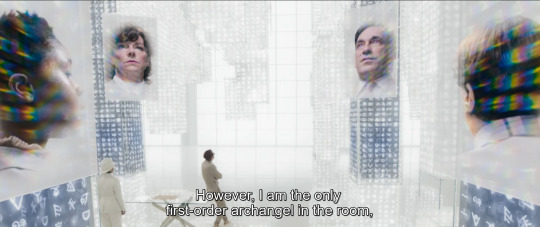
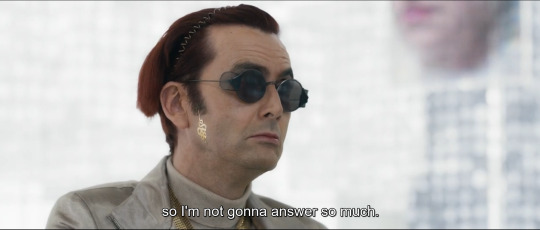
GABRIEL: I told you you could ask. However, I am the only First-Order archangel in the room, or, you know, the Universe, so I'm not gonna answer so much. But you feel free to knock yourself out with all the asking.
While I was writing my meta series The Passion Of Jimbriel it became fairly obvious to me there was something more going on between Crowley and Gabriel in S2 than just the numerous pointers to Crowley's pre-fall angel status. They are acting as both parallels and foils to each other, and in places you can swap their characters and get the same story at a different time – and that just opens up a whole new window of context and insight into things. For pre-reading, see this meta from @vidavalor that nicely lists some obvious parallels. It doesn’t mention everything though, so I’m going to discuss parts in more detail.
A foil is a character who contrasts with the protagonist, to highlight or differentiate certain qualities between the characters. Crowley and Gabriel do this because they have come from essentially the same place, and share some story elements, but they still end up in different places.
There is a lengthy original discussion about Crowley's pre-fall angel status here, for pre-reading. It points out the obvious and some not so obvious points that ops have noticed in S2 telling us about Crowley's pre-fall status. Rather than just go through them all again, I'd like to look at some other scenes in S2 that also tell us something about both the similarities and the differences between these two high-powered entities as I go along. In addition, I’ve done a series of posts looking at Gabriel as a shoulder angel (links at the end of post,) because quite often he’s on the demonic left-hand side – which makes sense when you realize he’s a Crowley parallel.
Take the arrival of Gabriel to Whickber St and the bookshop. I’ve already mentioned this parallel story line a couple of times now, but lets look at it again in more detail. It mirrors the opening of S1E1 where the serpent climbs the wall of the Garden of Eden, morphs into a demon and starts to converse with the angel standing on the wall.
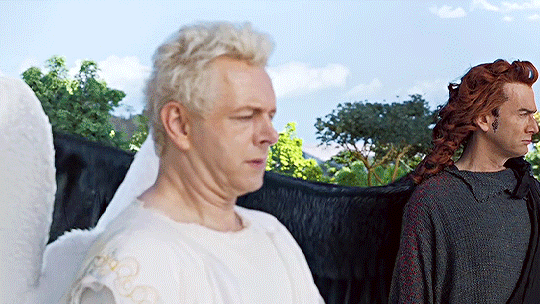
Back in the present day, we have a Gabriel, who also tends to present on the sinister-side, walking up to the gate of the present day Garden (the bookshop), which is still guarded by the same angel as it was 6000 years ago, and basically tells Aziraphale he has “fallen.”
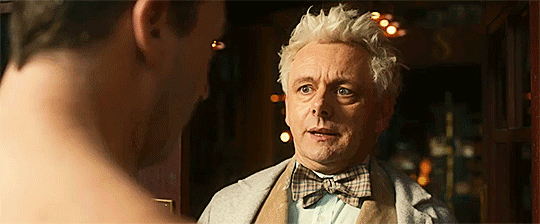
How to we know this? It is a reference to the Fall of Man, when Adam and Eve ate the apple the serpent offered them, they suddenly became aware of their nakedness, and hid from God. Gabriel has already upset the love-apple tomato cart on his way to the door of the bookshop, its a sign of the chaos to come.
The fallen angel is not sure of his name, so he prompts with a question…
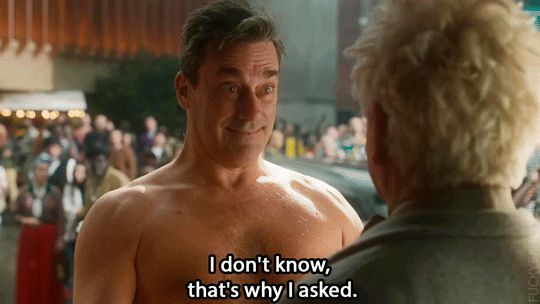
And asks for shelter under the (reluctant) angel’s wing..
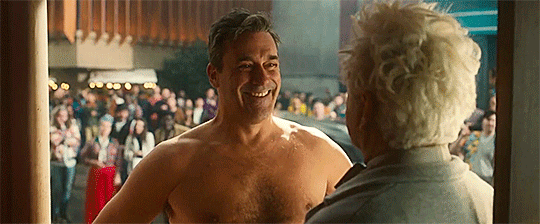
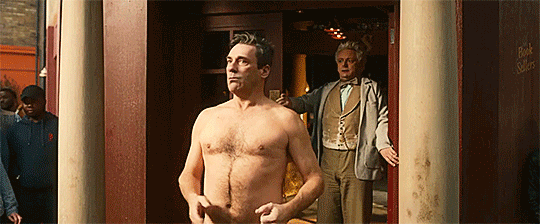
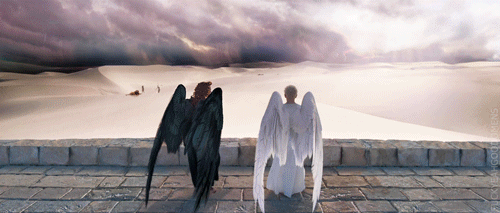
But there is one thing he does know, the one thing that drew him to Aziraphale in the first place:
AZIRAPHALE: Then why did you come to my shop? GABRIEL: I don't know. I just thought I should. You know what it's like when you- when you don't know anything at all, and yet you're totally certain that everything would be better if you were just near one particular person?

Later, Aziraphale realizes that he must give Gabriel a new name to hide him – because fallen angels take on a new name, don’t they? Just like Crowley did.
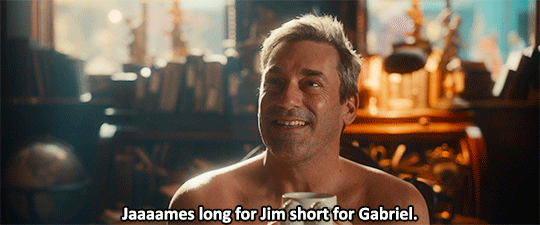
Then we get a confession:
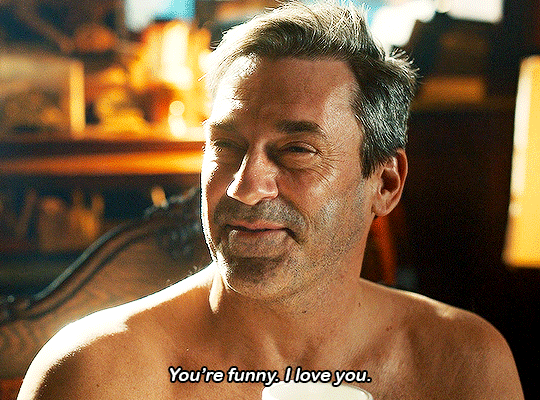
Which is what Crowley loves about Aziraphale as well - that bit of unpredictability, because you know how humour kind of works? It throws the unexpected at you.
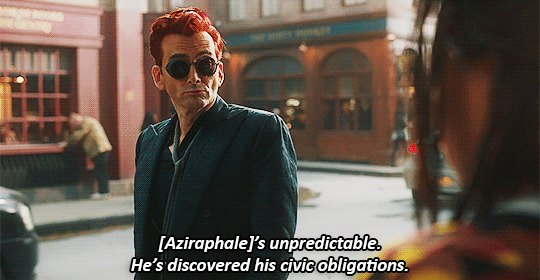
Early on in S2 we find out they are both in trouble: first His Royal Smugness, then Our Hero himself. Our view is turned upside down, with the angel made the bad guy and the demon the good guy who needs to win. But both of them are being hunted by Shax.
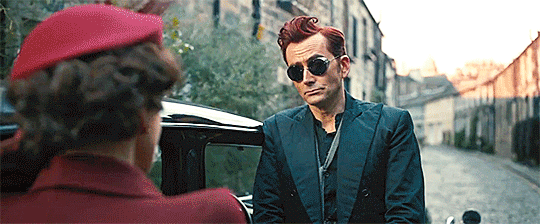
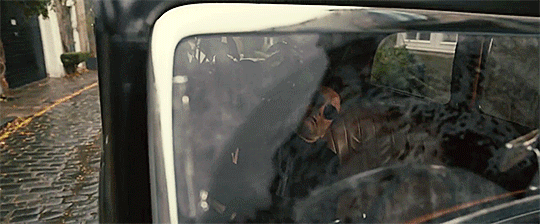
Then we get one of the early clues pointing to Crowley's high status as an angel:
SHAX: A miracle of enormous power happened last night. The kind of miracle only the mightiest of Archangels could've performed. CROWLEY: Mm? SHAX: Somewhere very close to your friend's bookshop. Are you telling me you don't know what caused it? CROWLEY: How'd you know I didn't do it?
Shax stalks and threatens both of them, sometimes at the same time:

Another parallel Gabriel and Crowley shared in S2 were associating their identity - no, lets rephrase that - "essence" was one description I've seen - with boxes.
Gabriel arrives with a box that strategically covers his front, and quickly tosses it aside once Aziraphale opens the door to the bookshop. It lies forgotten until Gabriel mentions it a while later. Inside it is the fly from Beelzebub - an object from Hell - so it really needs to be 'invited' across the threshold of the bookshop by Aziraphale to be able to enter. The box initially appears to be empty, Once inside, the fly is free to roam. It has a message written on one side of it.
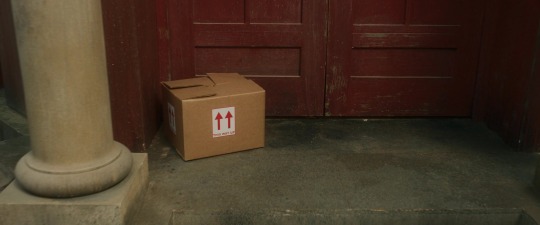
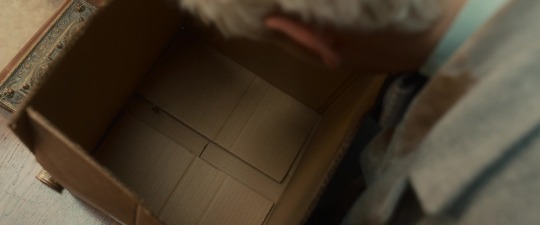
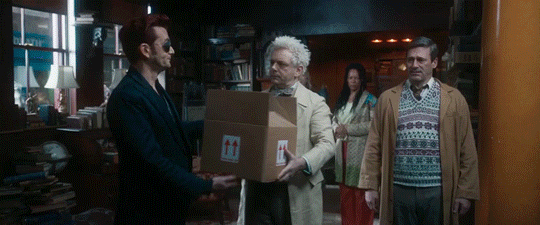
The same goes for the matchbox. Message included.
ah, wot? you say. Yep.
The matchbox represents Crowley, probably in more ways than one, but I'll just go through the stuff relevant to this meta here.
I notice I'm not the only op to connect the line from the Book of Job on the side of the matchbox with Crowley. The line is from Verse 41, which talks about Leviathan. Among the various shapes it is described to take is a great sea serpent. This deserves its own meta for further discussion, which I plan to do after this one, because yes, Crowley is Leviathan in disguise, but there is much more to it than that. But for now, just know that the matchbox is Crowley.
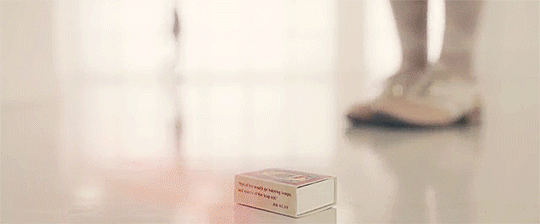
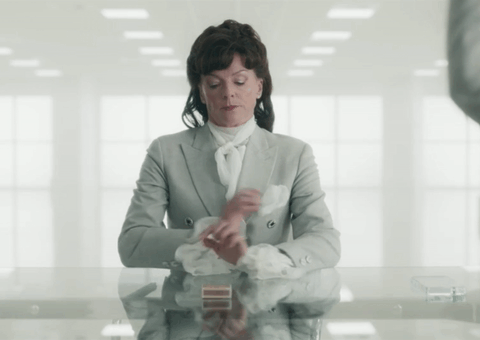
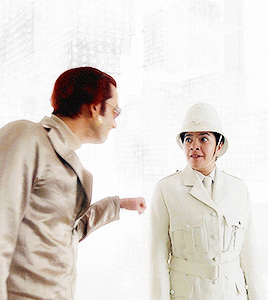
Once you know this, it makes sense that Muriel finds it - a discarded cardboard box by the front door to Heaven - and deals with a material object that shouldn't by rights exist in Heaven. Then a certain demon finds Muriel lurking outside during the siege on the bookshop at the end of S2E5, and talks them into letting the certain demon be escorted up into Heaven where he doesn't belong, where he's free to roam around - only he needs a guide because he's not sure where to go. Ah Muriel, you poke the Serpent, he's going to poke you back. Good thing he likes you, and it just was a gentle nudge.
Two empty boxes, two cases of memory-loss. That is what S2 seems to suggest to us at first glance.
Gabriel's seems to be the most straight forward in hindsight - find the fly and restore Gabriel to his original "Gabriel-ness." But its more complicated than that. When pushed to remember, his lilac eyes return and another voice can be heard speaking through him of the past. This happens twice, with the second one being part-prophecy. What is really triggering these episodes of channeling? Is it God or someone else speaking through him? We really aren't sure at this point in time.
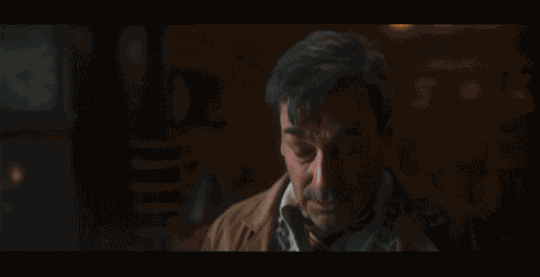
Then there are questions around Crowley's memory. Did he have his memory wiped when he fell? Was it wiped repeatedly? Was it not wiped at all, and he just pretends he doesn't remember? Neil has even said he is an unreliable narrator about his own Fall, so who are we to trust at this point? Crowley does seem to understand in the end some of the problems Gabriel is having with his absent memories and that brings them to a temporary truce.
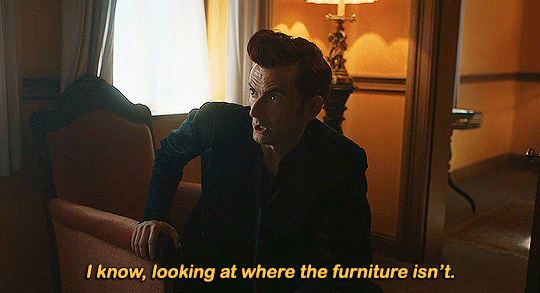
Both Aziraphale and Michael inspect their respective "empty" boxes, and neither notices anything obviously amiss. Gabriel's box just seems empty to Aziraphale, he takes no notice of the fly container in there, and archangel Michael tentatively inspects the matchbox brought to them by Muriel but nothing seems out of place there either.
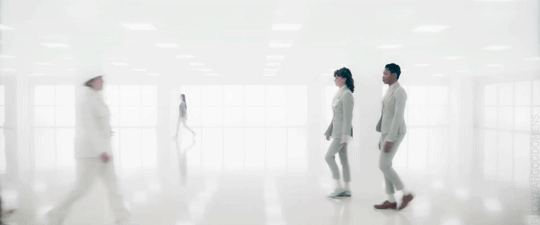
Crowley's change in costume in Heaven during his little infiltration caper with Muriel is also another clue to his past status as an archangel. He has a silvery-gray suit, similar in style to Saraqael's to reinforce the link with them, but at the same time he is also mocking the other archangels and their elite status. We've assumed for a while now that the appearance of the tactical turtleneck signals that Crowley is up to something sneaky or spy related, but I'm starting to think it also relates to a bit of a power play (and Crowley certainly laid the power on for Mr Brown in the pub!) Looking back at S1, Gabriel's not adverse to wearing one either when he needs to be at his worst (or best. Your choice.)

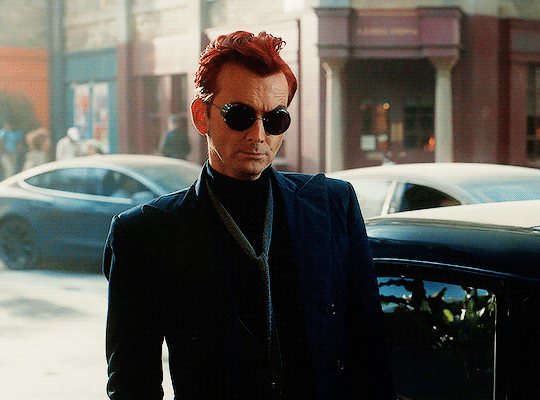
The way one dresses is a way of expressing and reinforcing authority, and its something both Gabriel and Crowley do without much thought. They have been used to being in a position of power and/or independent authority for much of their existence, and I would say that even if Crowley is a few steps down now from where he started, and he's more cautious around those higher ranking than him than he used to be, he still retains that knowledge of what its like to be at the top.
Crowley's usual near all-black costume is a form of power dressing in itself. Whether is was in the past, when black was an expensive color to buy and maintain in clothing, or in the present day, we are still respectful of those in a stylish cut of black.
Gabriel's impeccable tailoring as Supreme Archangel also commands respect. So it's no wonder that one of Gabriel's first requests on regaining his memories was to ask for new clothes! He wasn't just being the vain archangel we believe him to be (although, I think there is still some of that) you also need to consider the elements of the reference characters that went into his shop assistant character: Granville, the belittled shop assistant nephew from the sitcom Open All Hours, who got stuck with all the shop duties from his uncle and felt like life was passing him by, and the silly Monty Python gumbies, that complained of hurting brains - lovable and much loved characters, but not ones you'd really want to be forever. We all want to be loved, but we want to be respected as well.
For all his fierce posturing around Gabriel, there is a brief moment in S2E3 where Crowley backs down and treats Gabriel as an equal - and that is reflected in a change of dress as well. His outside jacket off and sleeve-garters on, Crowley sports a look we haven't seen since S1 when he was home alone in his Mayfair flat. He patiently explains gravity to a curious Gabriel and then describes his "Operation Lovebirds" plan to his puzzled companion. He admits he hasn't "done weather in ages." It's just a quiet, charming moment, watching two ex-archangels get along together.
You're smiling, aren't you?
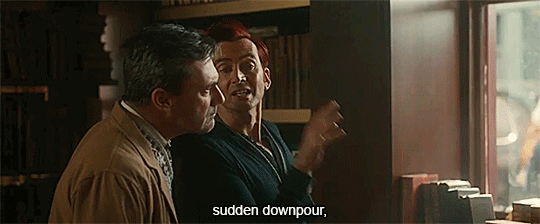
This meta continues in Part 2: Foils of War, where the differences between Gabriel and Crowley get explored in more detail, and how Aziraphale and Beelzebub act as mirrors to each other a few times as well.
This meta is part of a series on Gabriel: Gabriel as a Shoulder Angel: S1 Study S2 Study Part 1: Ep.1 The Arrival and Ep. 2 The Clue S2 Study Part 2: Ep.3 I Know Where I'm Going and Ep. 5 The Ball S2 Study Part 3: Ep.6 Every Day
First-Order Archangels Part 2: Foils of War
First-Order Archangels Part 3: Seeing Eye to Eye
#good omens#good omens 2#good omens meta#crowley#gabriel#the only first-order archangel in the room#or you know the universe#aziraphale#garden of eden#fallen angel#his royal smugness#how will our hero cope#maybe you'll spot an archangel#book of job#vavoom
181 notes
·
View notes
Text
One sun pun : Gabriel's tomatoes
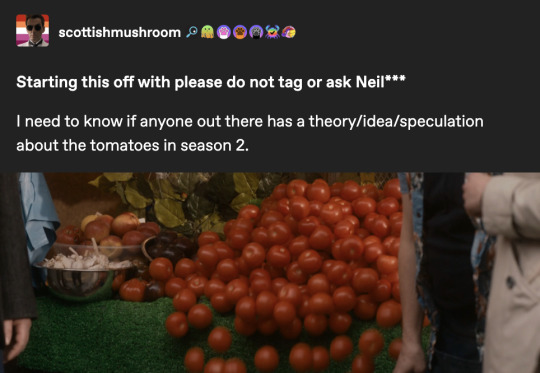
Hello there tomato-wonderer @scottishmushroom. I saw your post about tomatoes and I come bearing fruit answers! I was also wondering about the tomatoes, and it led me down a spiralling path of tarot cards and visual puns. I'm pretty sure Gabriel's entire entrance scene in season 2 is based on tarot card 19: The Sun. Allow me to explain...
Here is the Sun tarot card in the Rider-Waite deck, which was used as visual inspiration both season's 1 & 2 of GO. Notice anything familiar?
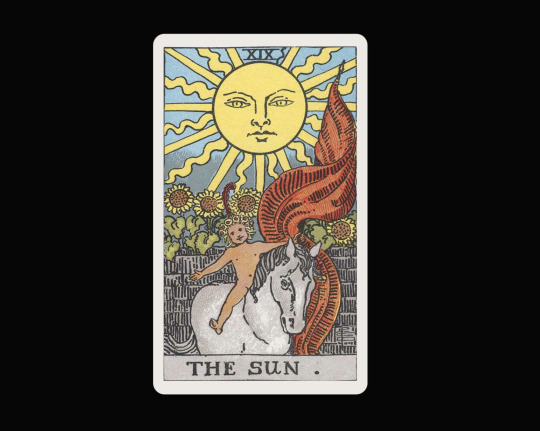
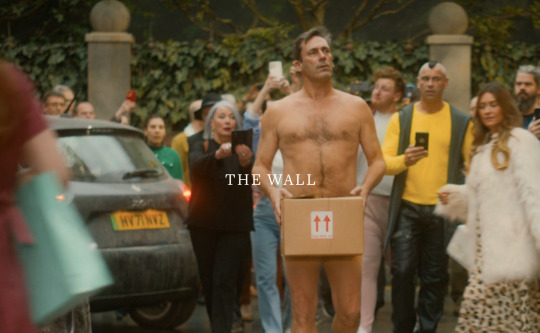
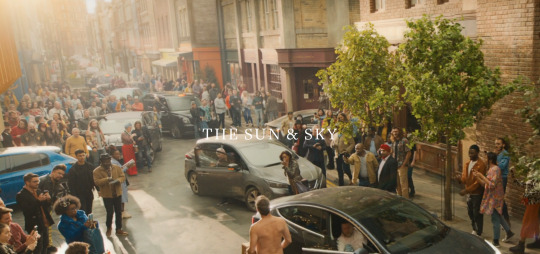
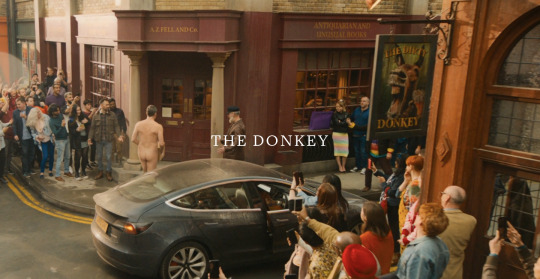
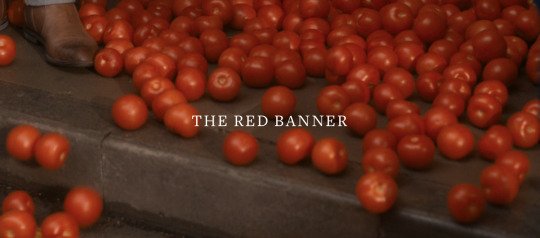

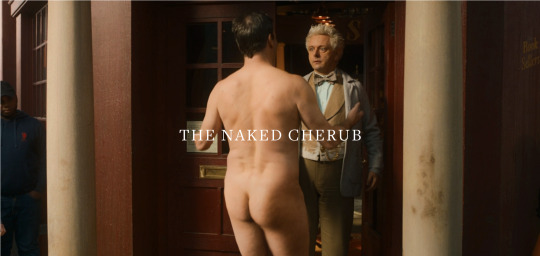
All of the elements of The Sun card are hidden in these opening shots quite cleverly. I am suggesting here that the red banner (that the sun carries on the card) is represented by the spill of red tomatoes because: it's a sun pun! You see tomato in English & French from the Spanish word "Tomate" that took over in the 1850s, but there's also an older expression for tomatoes that was used since it's import to Europe, that is still the origin of the word in Italian : Pomodoro.
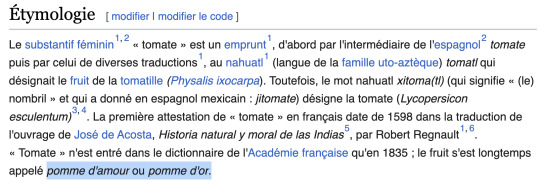
In French we used to call it pomme d'or: just like in Italian today, the French (and the normans who were the reigning class in England) would have called it a Golden or Sun Apple, due to it's need for extreme sunshine to grow.
Which is a great callback to Gabriel's character in season one because of this iconic line:
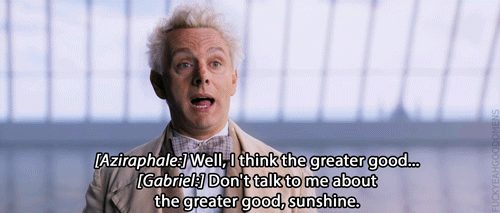
But that's not all: Tomato was also called "Pomme D'amour" or love apple, due to how it looked like a human heart. So Gabriel walking into Soho triggering a spill of bright red sun-apples also has a double meaning as he steps on one : crushing a heart. Still not enough sun for you? Well, there's more! While Gabriel is marching into Soho we get a musical number called "Into Soho" on the Prime video series soundtrack. However, once Gabriel gets to the door and knocks, it quickly switches to a preview of a theme we won't hear until episode 6, when Gabriel opens the fly and remembers : it's a track on disc 2 called "Gabriel Revealed".
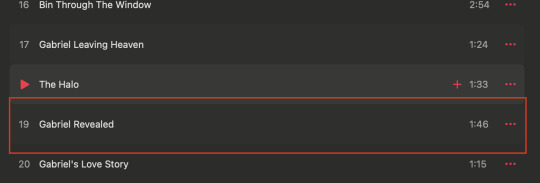
Yes, haha they made a secret "Gabriel is naked" joke in the soundtrack when he is revealed. The bonkers part comes when your realize what number the track is in the list....

#good omens 2#art director talks good omens#good omens meta#go season 2#go meta#good omens season 2#good omens season two#good omens#archangel gabriel#tarot cards#tarot#good omens puns#good omens analysis
109 notes
·
View notes